#View of Constantinople by Evening Light
Explore tagged Tumblr posts
Text

Ivan Aivazovsky: View of Constantinople by Evening Light (1884)
3K notes
·
View notes
Text

Title: View of Constantinople by evening light
Artist: Ivan Aivazovsky
Date: 1846
Style: Romanticism
Genre: Cityscape
✨ Feel free to check out our community for more art! ✨
#art#art history#artwork#painting#history#museums#culture#vintage#curators#museum#ivan aivazovsky#romanticism#cityscape
133 notes
·
View notes
Text

-View of Constantinople by evening light-
#art#art history#artwork#culture#history#museums#painting#vintage#ivan aivazovsky#curators#romanticism#cityscape
45 notes
·
View notes
Text

Ivan Konstantinovich Aivazovsky, View of Constantinople by evening light (Вид Константинополя при вечернем освещении), 1846
27 notes
·
View notes
Text
SAINTS&READING: SATURDAY, AUGUST 31, 2024
august 18_august 31
MARTYRS FLORUS AND LAURUS IN SYRIA (2nd c.)

The Martyrs Florus and Laurus were brothers by birth not only in flesh but in spirit. They lived in the second century at Byzantium, and afterwards they settled in Illyria [now Yugoslavia]. By occupation they were stone-masons (their teachers in this craft were the Christians Proclus and Maximus, from whom also the brothers learned about life pleasing to God).
The prefect of Illyria, Likaion, sent the brothers to a nearby district for work on the construction of a pagan temple. The saints toiled at the structure, distributing to the poor the money they earned, while they kept strict fast and prayed without ceasing.
Once, the son of the local pagan-priest Mamertin carelessly approached the structure, and a chip of stone hit him in the eye, severely injuring him. Saints Florus and Laurus assured the upset father, that his son would be healed.
They brought the youth to consciousness and told him to have faith in Christ. After this, as the youth confessed Jesus Christ as the true God, the brothers prayed for him, and the eye was healed. In view of such a miracle, even the father of the youth believed in Christ.
When the construction of the temple was completed, the brothers gathered the Christians together, and going through the temple, they smashed the idols. In the eastern part of the temple they set up the holy Cross. They spent all night in prayer, illumined with heavenly light. Having learned of this, the head of the district condemned to burning the former pagan priest Mamertin and his son and 300 Christians.
The martyrs Florus and Laurus, having been sent back to the prefect Likaion, were thrown down an empty well and covered over with earth. After many years, the relics of the holy martyrs were uncovered incorrupt, and transferred to Constantinople. In the year 1200 the Novgorod pilgrim Anthony saw them. Stephen of Novgorod saw the heads of the martyrs in the Pantokrator monastery around the year 1350.
Source: Orthodox Church in America_OCA
VENERABLE CHRISTOPOULOS THE PHILOSOPHER (12th c.)

The great Church figure and philosopher St. Christodoulos was from the village of Sakara in the Imereti region. He possessed an exceptional knowledge of the Holy Scriptures and spoke several languages fluently. To support his prodigious understanding of the Christian Faith, Christodoulos became thoroughly acquainted with other creeds as well. To this purpose, he even memorized the Koran. Once the Persian king Iamame arranged a debate on theological issues between the Muslims and the Christians, and he invited the elder Christodoulos to take part in this event. At first the king himself debated with the elder and suffered an upset. Then a certain pagan astrologer was brought to replace him, and when it became clear that he too was no match for the elder-philosopher, he summoned a renowned scholar to outwit him. In the debates with this scholar, Christodoulos freely cited both the Holy Scriptures and the Koran, and with his brilliant logic and rhetoric he triumphed over his rival. His challengers were disgraced.
In his work Pilgrimage, the famous 19th-century historian Archbishop Timote (Gabashvili) describes his journey to Mt. Athos and notes that St. Christodoulos had labored with the monks of the Iveron Monastery. Church historians believe that St. Christodoulos labored first in Georgia, then moved to Mt. Athos, and finally to the island of Patmos.
© 2006 St. Herman of Alaska Brotherhood.


Romans 15:30-33
30 Now I beg you, brethren, through the Lord Jesus Christ, and through the love of the Spirit, that you strive together with me in prayers to God for me, 31 that I may be delivered from those in Judea who do not believe, and that my service for Jerusalem may be acceptable to the saints, 32 that I may come to you with joy by the will of God, and may be refreshed together with you. 33 Now the God of peace be with you all. Amen.
Matthew 17:24-18:4
24 When they had come to Capernaum, those who received the temple tax came to Peter and said, "Does your Teacher not pay the temple tax?" 25 He said, "Yes." And when he had come into the house, Jesus anticipated him, saying, "What do you think, Simon? From whom do the kings of the earth take customs or taxes, from their sons or from strangers?" 26 Peter said to Him, "From strangers." Jesus said to him, "Then the sons are free. 27 Nevertheless, lest we offend them, go to the sea, cast in a hook, and take the fish that comes up first. And when you have opened its mouth, you will find a piece of money; take that and give it to them for Me and you.
1 At that time the disciples came to Jesus, saying, "Who then is greatest in the kingdom of heaven?" 2 Then Jesus called a little child to Him, set him in the midst of them, 3 and said, "Assuredly, I say to you, unless you are converted and become as little children, you will by no means enter the kingdom of heaven. 4 Therefore whoever humbles himself as this little child is the greatest in the kingdom of heaven.
#orthodoxy#orthodoxchristianity#easternorthodoxchurch#originofchristianity#spirituality#holyscriptures#gospel#bible#wisdom#faith#saints#jesus christ
3 notes
·
View notes
Text

View of Constantinople by Evening Light, art by Ivan Aivazovsky (1846)
1 note
·
View note
Text
2023-2024 Brontoscopic Calendar
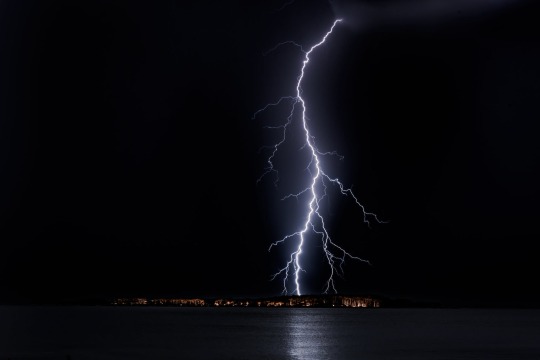
Photo by Philippe Donn on Pexels.com
[ID: An image of a black sky with lightning striking in the centre, with golden lights suggesting that it is in a city.]
view this post on wordpress.com
Content warning: The brontoscopic calendar refers to several possibly triggering events, such as death, disease, animal death, and abortion. The text also refers to common practices in the ancient world such as slavery, which we must acknowledge for the evil it is.
ACCREDITED TO TAGES, the brontoscopic calendar—a divinatory almanac of sorts—only survives within a Roman Byzantine translation of a Latin edition of an Etruscan calendar, said to have been recorded by Johannes Lydus (“John the Lydian”) in De ostentis (“On Portents”) from Justinian Constantinople. Etruria had many almamacs created by Rasenna’s people across its lifetime—but only one survives in full, which is this calendar.
The brontoscoptic calendar begins upon the first full moon in Cancer, which in 2023 is July 3rd/July 4th. Please note that the Etruscan day begins at noon, so ensure when using this that you keep it in mind—which I have indicated at the 12:00 mention of each day. For example, if it thundered on July 5th at 09:00, the message would be the one given on the fourth as the Etruscan day has not yet changed.
To use this calendar, if it thunders look for the day indicated and check the time of the event to ensure it is the proper day. Then look at the prediction and interpret from there. You may also check the 16 divisions of heaven to see which aiser sent the omen you have received. The calendar is very direct in what can happen, but with all divination, there is always more that could be understood and therefore avoided—or followed if favourable.
This year’s calendar is cut off as next year the full moon in Cancer is June 21st.
JULY-AUGUST 2023
CANCER JUNE 21ST-JULY 22ND
LEO JULY 23RD-AUGUST 22ND
FIRST FULL MOON IN CANCER: JULY 3RD-JULY 4TH: If in any way it should thunder, there will be an abundance of fruits, with the exception of barley; but dangerous diseases will be inflicted upon bodies.
12:00 JULY 5TH: If in any way it should thunder, women in labour will have an easy delivery,
but there will be abortion of cattle, yet there will be an abundance of fish.
12:00 JULY 6TH: If in any way it should thunder, there will be a scorching and drying wind,
such that not only grains but even the soft fruits will be parched through and through and shrivel up.
12:00 JULY 7TH: If in any way it should thunder, the air will be cloudy and rainy, so that out of a mouldy dampness the crops will rot.
12:00 JULY 8TH: If in any way it should thunder, ill-omened for the countryside. Those
responsible for villages or towns will be thrown into a state of disorder.
12:00 JULY 9TH: If in any way it should thunder, just as the crops are maturing, some sort of wild pest that has sunk deep into them will waste them.
12:00 JULY 10TH: If in any way it should thunder, diseases will infect [men], but not many shall die. And although the cereal crops shall be successful, the soft fruits shall dry up.
12:00 JULY 11TH: If in any way it should thunder, it indicates wet weather, and ruin of the grain.
12:00 JULY 12TH: If in any way it should thunder, there will be a loss of flocks through being overrun by wolves.
12:00 JULY 13TH: If in any way it should thunder, there will be frequent death, yet prosperity.
12:00 JULY 14TH: If in any way it should thunder, there will be days of heat, burning but aarmless; there will be glad festivities in political affairs.
12:00 JULY 15TH: If in any way it should thunder, the same thing as on the preceding day.
12:00 JULY 16TH: If in any way it should thunder, it announces the fall of a ruler.
12:00 JULY 17TH: If in any way it should thunder, the atmosphere shall be burning hot, but there will be abundant harvest and good flow, not the poorest, of the river fish. Bodies, nevertheless, shall be utterly weak.
12:00 JULY 18TH: If in any way it should thunder, the winged creatures shall be injured during the summer, and also the fish shall perish.
12:00 JULY 19TH: If in any way it should thunder, it threatens not only dearth of the necessities of life, but also war, and a prosperous man shall disappear from public life.
12:00 JULY 20TH: If in any way it should thunder, there shall be days of burning heat and destruction by mice, blind-mice, and locusts. Still, it brings abundance and at the same time murders to the people.
12:00 JULY 21ST: If in any way it should thunder, it threatens destruction to the crops [soft fruits].
12:00 JULY 22ND: If in any way it should thunder, pests destructive to the crops shall perish.
12:00 JULY 23RD: If in any way it should thunder, it threatens discord for the community.
12:00 JULY 24TH: If in any way it should thunder, it means there will be a dearth of wine, but an increase in the other crops, and an abundance of fish.
12:00 JULY 25TH: If in any way it should thunder, the hot weather will be especially ruinous.
12:00 JULY 26TH: If in any way it should thunder, it announces good cheer, a putting aside of ills, and an end to disease.
12:00 JULY 27TH: If in any way it should thunder, it announces plenty.
12:00 JULY 28TH: If in any way it should thunder, there will be wars and countless ills.
12:00 JULY 29TH: If in any way it should thunder, the winter will be especially harmful to the crops.
12:00 JULY 30TH: If in any way it should thunder, there is danger from the army for the men in power.
12:00 JULY 31ST: If in any way it should thunder, there will be a good harvest for the crops.
12:00 AUGUST 1ST: If in any way it should thunder, the affairs of the queenly city [Tarquinia, or possibly Rome or Constantinople] will be improved.
12:00 AUGUST 2ND: If in any way it should thunder, in a short time there shall be frequent death.
AUGUST-SEPTEMBER 2023
LEO JULY 23RD-AUGUST 22ND
VIRGO AUGUST 23RD-SEPTEMBER 22ND
NEW MOON: AUGUST 17TH: Upon the new moon, if in any way it should thunder, there shall be plenty, yet there shall be ruin of the flocks.
12:00 AUGUST 18TH: If in any way it should thunder, the late autumn will be good.
12:00 AUGUST 19TH: If in any way it should thunder, it signals a heavy winter.
12:00 AUGUST 20TH: If in any way it should thunder, the airs will be turbulent, so that of them will be born scarcity.
12:00 AUGUST 21ST: If in any way it should thunder, there will be an abundance of grain, yet it is the downfall of a virtuous ruler.
12:00 AUGUST 22ND: If in any way it should thunder, it threatens death-bearing diseases to the fortunes of slaves.
12:00 AUGUST 23RD: If in any way it should thunder, there will be rains harmful to the grain fields.
12:00 AUGUST 24TH: If in any way it should thunder, it signifies peace for the community, but ruin for the cattle herds, and a dry cough shall infect.
12:00 AUGUST 25TH: If in any way it should thunder, it foretells a vision of the gods and the advancement of many good men.
12:00 AUGUST 26TH: If in any way it should thunder, there will be lifesaving river waters.
12:00 AUGUST 27TH: If in any way it should thunder, it signals hot weather and stormy rain and a scarcity of grain.
12:00 AUGUST 28TH: If in any way it should thunder, there will be unexpected cold in the summer, because of which the necessities of life will be spoiled.
12:00 AUGUST 29TH: If in any way it should thunder, there will appear the most poisonous reptiles.
12:00 AUGUST 30TH: If in any way it should thunder, it shows one man will come to power over many. But this man is most unjust in state affairs.
12:00 AUGUST 31ST: If in any way it should thunder, there will be dissension among the common people and a scarcity of grain.
12:00 SEPTEMBER 1ST: If in any way it should thunder, the king of the East … will be overcome [by?] war …and disease will be received from dry hot weather. * this section has been damaged
12:00 SEPTEMBER 2ND: If in any way it should thunder, it signifies the succession of a great ruler.
12:00 SEPTEMBER 3RD: If in any way it should thunder, it threatens a dearth of crops due to rainy weather.
12:00 SEPTEMBER 4TH: If in any way it should thunder, it signifies war and the destruction of the powerful. On the other hand, there will be a plenty of cereals.
12:00 SEPTEMBER 5TH: If in any way it should thunder, it threatens an unhealthy drought.
12:00 SEPTEMBER 6TH: If in any way it should thunder, there will be disagreement among the subjects, but not for long.
12:00 SEPTEMBER 7TH: If in any way it should thunder, it signals good things for the affairs of state, but for the bodies, diseases around the head.
12:00 SEPTEMBER 8TH: If in any way it should thunder, the dissension of the common people will come to an end.
12:00 SEPTEMBER 9TH: If in any way it should thunder, it shows the possible misfortune of a powerful man.
12:00 SEPTEMBER 10TH: If in any way it should thunder, it will go badly for a band of youth and also for the crops along with them. It will be a disease-bearing time.
12:00 SEPTEMBER 11TH: If in any way it should thunder, after great plenty there will be famine.
12:00 SEPTEMBER 12TH: If in any way it should thunder, it threatens subcutaneous eruptions to [men’s] bodies.
12:00 SEPTEMBER 13TH: If in any way it should thunder, there will be a dearth of water and a plague of poisonous reptiles.
12:00 SEPTEMBER 14TH: If in any way it should thunder, it signifies a good harvest.
12:00 SEPTEMBER 15TH: If in any way it should thunder, men bent on vengeance shall slip into the worst kind of treachery.
SEPTEMBER-OCTOBER 2023
VIRGO AUGUST 23RD-SEPTEMBER 22ND
LIBRA SEPTEMBER 23RD-OCTOBER 22ND
12:00 SEPTEMBER 16TH: If in any way it should thunder, the affairs of the state will be slightly better, and there will be plenty.
12:00 SEPTEMBER 17TH: If in any way it should thunder, it threatens both diseases and at the same time a dearth of the necessities of life.
12:00 SEPTEMBER 18TH: If in any way it should thunder, it threatens both [public] trials and debates among the common people.
12:00 SEPTEMBER 19TH: If in any way it should thunder, there will be a dearth of foodstuffs for
both humans and dumb animals.
12:00 SEPTEMBER 20TH: If in any way it should thunder, it signifies that the women are the more sagacious.
12:00 SEPTEMBER 21ST: If in any way it should thunder, there will be an abundance of honey, yet a lack of both water and the other foodstuffs.
12:00 SEPTEMBER 22ND: If in any way it should thunder, it signals harsh winds and diseases at the same time.
12:00 SEPTEMBER 23RD: If in any way it should thunder, it threatens harmless disease to the four-footed.
12:00 SEPTEMBER 24TH: If in any way it should thunder, it proclaims good health for men for a full year.
12:00 SEPTEMBER 25TH: If in any way it should thunder, it threatens bodily pains and wretchedness for the greater part of the people.
12:00 SEPTEMBER 26TH: If in any way it should thunder, there will be a good harvest, yet the downfall of reptiles and harm to men.
12:00 SEPTEMBER 27TH: If in any way it should thunder, there will be an abundance of cattle fodder and of acorns, but in the first ripening season, it will go badly.
12:00 SEPTEMBER 28TH: If in any way it should thunder, there will be plague upon the bodies of both humans and dumb animals.
12:00 SEPTEMBER 29TH: If in any way it should thunder, it signals war for all the people, yet an abundance of crops.
12:00 SEPTEMBER 30TH: If in any way it should thunder, affairs will change for the worse.
12:00 OCTOBER 1ST: If in any way it should thunder, it promises a deep peace.
12:00 OCTOBER 2ND: If in any way it should thunder, the men of lowly degree shall be gloomy.
12:00 OCTOBER 3RD: If in any way it should thunder, it threatens civil war.
12:00 OCTOBER 4TH: If in any way it should thunder, the women and the servile class will dare to undertake murders.
12:00 OCTOBER 5TH: If in any way it should thunder, it threatens a plague on the cattle and disorder in the affairs of state.
12:00 OCTOBER 6TH: If in any way it should thunder, it threatens at once prosperity and discord among the commons.
12:00 OCTOBER 7TH: If in any way it should thunder, affairs will be moderately good for an entire year.
12:00 OCTOBER 8TH: If in any way it should thunder, it signifies that the lightning bolt shall fall, and warns of slaughter.
12:00 OCTOBER 9TH: If in any way it should thunder, it threatens the loss of wellborn youths.
12:00 OCTOBER 10TH: If in any way it should thunder, it foretells that during a stormy winter there will be a scarcity of soft fruits.
12:00 OCTOBER 11TH: If in any way it should thunder, it signals war.
12:00 OCTOBER 12TH: If in any way it should thunder, it threatens at once wars and treachery.
12:00 OCTOBER 13TH: If in any way it should thunder, it signals both an abundance of crops and a loss by death of cattle.
12:00 OCTOBER 14TH: If in any way it should thunder, it signals no sort of reversal.
12:00 OCTOBER 15TH:If in any way it should thunder, it threatens diseases in the city over which it [the thunder] is cast down.
OCTOBER-NOVEMBER 2023
LIBRA SEPTEMBER 23RD-OCTOBER 22ND
SCORPIO OCTOBER 23RD-NOVEMBER 22ND
12:00 OCTOBER 16TH: If in any way it should thunder, it signifies both a good harvest and good cheer.
12:00 OCTOBER 17TH: If in any way it should thunder, there will be discord among the common people.
12:00 OCTOBER 18TH: If in any way it should thunder, it signifies heavy rains and war.
12:00 OCTOBER 19TH: If in any way it should thunder, it signifies the downfall of a powerful man and preparation for war.
12:00 OCTOBER 20TH: If in any way it should thunder, it signifies an abundance of barley but a decrease in wheat.
12:00 OCTOBER 21ST: If in any way it should thunder, there shall be power among the women greater than [what is] appropriate to their nature.
12:00 OCTOBER 22ND: If in any way it should thunder, it threatens a disease and out of it, a disaster for the servile class.
12:00 OCTOBER 23RD: If in any way it should thunder, it indicates that those especially powerful will consider crooked dealings in government, but they will not achieve their aims.
12:00 OCTOBER 24TH: If in any way it should thunder, it threatens that a disease-bearing wind will blow.
12:00 OCTOBER 25TH: If in any way it should thunder, there will be strife in the area in which the thunder is let loose; for another place [it is] not inapplicable.
12:00 OCTOBER 26TH: If in any way it should thunder, the underlings of the wellborn will foment revolution in the state.
12:00 OCTOBER 27TH: If in any way it should thunder, it says that the time of harvest shall be very rainy and there shall be famine.
12:00 OCTOBER 28TH: If in any way it should thunder, it threatens grave famine.
12:00 OCTOBER 29TH: If in any way it should thunder, it threatens diseases.
12:00 OCTOBER 30TH: If in any way it should thunder, it signifies a wet spell, but at the same time, prosperity.
12:00 OCTOBER 31ST: If in any way it should thunder, it is made known that there will be good sprouting, but [the plants will be] fruitless.
12:00 NOVEMBER 1ST: If it thunders, it threatens a lack of the necessities.
12:00 NOVEMBER 2ND: If it thunders, it signals both famine and wars.
12:00 NOVEMBER 3RD: If it thunders, the fruits of the trees will be successful, but there will be diseases and sedition among the commons.
12:00 NOVEMBER 4TH: If it thunders, it threatens the destruction of a famous man and war.
12:00 NOVEMBER 5TH: If it thunders, it threatens ills and losses for the people.
12:00 NOVEMBER 6TH: If it thunders, it signals prosperity yet a heavy and wet winter.
12:00 NOVEMBER 7TH: If it thunders, it foretells a time of need during the winter of the year.
12:00 NOVEMBER 8TH: If it thunders, it threatens a drought. There will be an abundant harvest of the hard-shelled fruits [nuts?], around late autumn though, they will be destroyed by storms.
12:00 NOVEMBER 9TH:If it thunders, out of civil unrest a tyrant shall be raised up, and he will be undone, but the powerful will be destroyed utterly with insufferable penalties.
12:00 NOVEMBER 10TH: If it thunders, a corrupt ruler will be felled by divine decision.
12:00 NOVEMBER 11TH: If it thunders, powerful men will work hatred toward themselves, and shall take sides against each other.
12:00 NOVEMBER 12TH: If it thunders, there will be signs revealing great things. Beware lest it pour rain upon the fire of joyful elation.
12:00 NOVEMBER 13TH: If it thunders, it threatens a severe drought.
12:00 NOVEMBER 14TH: If it thunders, affairs of state [shall change] from worse to better.
NOVEMBER-DECEMBER 2023
SCORPIO OCTOBER 23RD-NOVEMBER 22ND
SAGITTARIUS NOVEMBER 23RD-DECEMBER 21ST
12:00 NOVEMBER 15TH: If it thunders, it threatens a corrupt tyrant over the affairs of state.
12:00 NOVEMBER 16TH: If it thunders, there will be prosperity but the destruction of the mice of dry land.
12:00 NOVEMBER 17TH: If it thunders, it signifies hurricanes and disturbances by which the trees will be overturned; there will be a great disruption in the affairs of common people.
12:00 NOVEMBER 18TH: If it thunders, the lower classes will have the upper hand over their betters, and the mildness of the air will be healthy.
12:00 NOVEMBER 19TH: If it thunders, there will be a surplus of all the necessities excepting grain.
12:00 NOVEMBER 20TH: If it thunders, appearance of future abundance, yet harvest will be less plentiful and autumn practically empty of fruit.
12:00 NOVEMBER 21ST: If it thunders, pulses will be plentiful but wine less.
12:00 NOVEMBER 22ND: If it thunders, an earthquake with roaring is to be expected.
12:00 NOVEMBER 23RD: If it thunders, it threatens destruction to wild beasts.
12:00 NOVEMBER 24RTH: If it thunders, it signifies the downfall of a praiseworthy man.
12:00 NOVEMBER 25TH: If it thunders, it signifies a strange sort of wind will be of service to the pastures.
12:00 NOVEMBER 26TH: If it thunders, there will be prosperity, but wind squalls will oppress.
12:00 NOVEMBER 27TH: If it thunders, commerce [Literally, “contracts” or “business dealings”] will be good, and prosperity in addition. He who controls the government with heavy hand will not be strong for very long.
12:00 NOVEMBER 28TH: If it thunders, it threatens war and the loss of flocks to death.
12:00 NOVEMBER 29TH: If it thunders, there will be scarcity from a dry and searing wind falling upon the crops.
12:00 NOVEMBER 30TH: If it thunders, men will be weakened in such a manner that they will seem to be unrecognizable.
12:00 DECEMBER 1ST: If it thunders, good fortune for a rich man and for men wellborn.
12:00 DECEMBER 2ND: If it thunders, it signifies a plentiful grain supply brought in from foreign lands.
12:00 DECEMBER 3RD: If it thunders, it warns the downfall of a ruler or the overthrow of a king, but it warns both discord among the common people and abundance.
12:00 DECEMBER 4TH: If it thunders, it warns there will be a festering wound, and for the many,extreme suffering out of the discord.
12:00 DECEMBER 5TH: If it thunders, there will be coughing sicknesses and oppression of the heart.
12:00 DECEMBER 6TH: If it thunders, it threatens for the people, bad conditions and spotted diseases.
12:00 DECEMBER 7TH: If it thunders, the people will be of marvelously good cheer.
12:00 DECEMBER 8TH: If it thunders, out of the discord of those in power, the common people will oppress [others].
12:00 DECEMBER 9TH: If it thunders, there will be heavy misery resulting from misfortunes.
12:00 DECEMBER 10TH: If it thunders, there will be an increase of animals, but at the same time they will suffer thirst.
12:00 DECEMBER 11TH: If it thunders, it signifies heavy rains.
12:00 DECEMBER 12TH: If it thunders, there will be a dearth of the necessities.
12:00 DECEMBER 13TH: If it thunders, a year of serious disease.
12:00 DECEMBER 14TH: If it thunders, it signifies not merely prosperity, but even fewer enemies, and good cheer for the state.
DECEMBER 2023-JANUARY 2024
SAGITTARIUS NOVEMBER 23RD-DECEMBER 21ST
CAPRICORN DECEMBER 22ND-JANUARY 19TH
12:00 DECEMBER 15TH: If it thunders, it signifies discord for the city.
12:00 DECEMBER 16TH: If it thunders, it foretells prosperity.
12:00 DECEMBER 17TH: If it thunders, situations will pertain through which the lower classes will oppress [their] betters.
12:00 DECEMBER 18TH: If it thunders, grain will be better.
12:00 DECEMBER 19TH: If it thunders, it signifies storm for the state, and disease for humans and dumb animals alike.
12:00 DECEMBER 20TH: If it thunders, borers will ruin the grain.
12:00 DECEMBER 21ST: If it thunders, for those who are in the west, both humans and dumb beasts, diseases.
12:00 DECEMBER 22ND: If it thunders, it says gluttony shall come about from menacing diseases.
12:00 DECEMBER 23RD: If it thunders, the common people will be led into misery, but an abundance of daily provisions.
12:00 DECEMBER 24TH: If it thunders, for those in power, it makes an end to their perverted plans. A parching wind will wrack the trees.
12:00 DECEMBER 25TH: If it thunders, men shall give blessings to the god, for the wind shall blow out of the east.
12:00 DECEMBER 26TH: If it thunders, it indicates insomnia for some time for men.
12:00 DECEMBER 27th: If it thunders, a wealthy yet sickly period threatens, tormenting bodies with internal worms.
12:00 DECEMBER 28TH: If it thunders, poisonous snakes shall somehow be gently undone by the men.
12:00 DECEMBER 29TH: If it thunders, the fish especially plentiful, but it shall plague the water-bound beasts. The commonwealth rather better.
12:00 DECEMBER 30TH: If it thunders, the creation of locusts and field-voles, to the king, danger, and there will be an abundance of grain.
12:00 DECEMBER 31ST: If it thunders, it signifies plentiful fodder for the flocks.
12:00 JANUARY 1ST: If it thunders, it signifies plentiful fodder for the flocks.
12:00 JANUARY 2ND: If it thunders, it signifies war and woes for city folk.
12:00 JANUARY 3RD: If it thunders, welfare of women.
12:00 JANUARY 4TH: If it thunders, it signifies famine not of long duration.
12:00 JANUARY 5TH: If it thunders, the mice shall perish; an abundance not merely of grain but also of pasturage, and a plenty of fish.
12:00 JANUARY 6TH: If it thunders, it signifies a year of well-being.
12:00 JANUARY 7TH: If it thunders, disease-bearing wind will blow.
12:00 JANUARY 8TH: If it thunders, the watch post shall complete for the state good service against enemy tricks.
12:00 JANUARY 9TH: If it thunders, there will be a very dangerous war.
12:00 JANUARY 10TH: If it thunders, it signifies a civil war and the death of many.
12:00 JANUARY 11TH: If it thunders, it threatens the same.
12:00 JANUARY 12TH: If it thunders, many of the councilmen of the wealthier rank shall be ruined utterly by cowardice.
12:00 JANUARY 13TH: If it thunders, the lower classes will do better, but the hoped-for fruit harvest shall be destroyed.
12:00 JANUARY 14TH: If it thunders, the mortals shall live in a condition more favored by the gods. Naturally, evils [will come] in due proportion.
JANUARY-FEBRUARY
CAPRICORN DECEMBER 22ND-JANUARY 19TH
AQUARIUS JANUARY 20TH-FEBRUARY 18TH
12:00 JANUARY 15TH: If it thunders, it signifies a year of well-being according to concord.
12:00 JANUARY 16TH: If it thunders, a plenty of fish and especially of fruits.
12:00 JANUARY 17TH: If it thunders, men will excessively consume their flocks because of a dearth of fish.
12:00 JANUARY 18TH: If it thunders, winter will be heavy, yet [there will be] abundance also.
12:00 JANUARY 19TH: If it thunders, it threatens mangy diseases.
12:00 JANUARY 20TH: If it thunders, the men shall be visited with visions of the faces of the gods, they shall experience a bad outcome.
12:00 JANUARY 21ST: If it thunders, it signifies the same for all.
12:00 JANUARY 22ND: If it thunders, virulent disease; out of it, though, will be an abundance of crops, but a plague on the flocks.
12:00 JANUARY 23RD: If it thunders, there will be the downfall of a famous man.
12:00 JANUARY 24TH: If it thunders, it threatens slaughter for men from diseases, but the fish shall be abundant.
12:00 JANUARY 25TH: If it thunders, heat-bearing shall be the summer season, and plenty imported from foreign lands.
12:00 JANUARY 26TH: If it thunders, it threatens diseases from diarrhea.
12:00 JANUARY 27TH: If it thunders, plenty, yet diseases it threatens.
12:00 JANUARY 28TH: If it thunders, it signifies at the same time civil war and abundance.
12:00 JANUARY 29TH: If it thunders, many will set out for war but few shall return.
12:00 JANUARY 30TH: If it thunders, newfangled affairs for the state.
12:00 JANUARY 31ST: If it thunders, it threatens that small locusts shall be born, yet there will still be plenty.
12:00 FEBRUARY 1ST: If it thunders, there shall be a heavy war.
12:00 FEBRUARY 2ND: If it thunders, it threatens prolongation of war.
12:00 FEBRUARY 3RD: If it thunders, it tells a lack of the necessities.
12:00 FEBRUARY 4TH: If it thunders, it threatens a hot and disease-making wind will blow.
12:00 FEBRUARY 5TH: If it thunders, the summer will be hot but plentiful in crops.
12:00 FEBRUARY 6TH: If it thunders, it signifies a disease for men but a harmless one.
12:00 FEBRUARY 7TH: If it thunders, it threatens civil wars for the city, and a plague on the beasts of the woods.
12:00 FEBRUARY 8TH: If it thunders, a movement of troops to war, but it will turn out well.
12:00 FEBRUARY 9TH: If it thunders, it threatens diseases for the slaves.
12:00 FEBRUARY 10TH: If it thunders, the king will help many.
12:00 FEBRUARY 11TH: If it thunders, the hatching of locusts.
12:00 FEBRUARY 12TH: If it thunders, it signifies the most healthful leanness for the bodies.
12:00 FEBRUARY 13TH: If it thunders, it signifies a rebellion against the kingdom and, reasonably, war.
FEBRUARY-MARCH 2024
AQUARIUS JANUARY 20TH-FEBRUARY 18TH
PISCES FEBRUARY 19TH-MARCH 20TH
12:00 FEBRUARY 14TH: If it thunders, a fast wind will blow, but not dangerous.
12:00 FEBRUARY 15TH: If it thunders, there will be unlooked-for war.
12:00 FEBRUARY 16TH: If it thunders, it shows after victory, loss for those in the war. Still, there will be plenty.
12:00 FEBRUARY 17TH: If it thunders, the common people will agree to make peace.
12:00 FEBRUARY 18th: If it thunders, it signals health for the flocks.
12:00 FEBRUARY 19th: If it thunders, it threatens a coughing sickness, but signifies an abundance of fish and of fruits.
12:00 FEBRUARY 20th: If it thunders, there will be a slave revolt and recurring illness.
12:00 FEBRUARY 21ST: If it thunders, the ruler of the state shall be in danger from the people.
12:00 FEBRUARY 22ND: If it thunders, the king of the East shall be in danger.
12:00 FEBRUARY 23RD: If it thunders, it signifies rapid movement of wind, and a plenty of grain, but a dearth of other crops.
12:00 FEBRUARY 24TH: If it thunders, it signals famine [reaching] just up to dumb animals.
12:00 FEBRUARY 25TH: If it thunders, men shall be damaged in their faces, but there will be much fodder [for horses/cattle], and a plenty of fish.
12:00 FEBRUARY 26TH: If it thunders, it threatens diseases.
12:00 FEBRUARY 27TH: If it thunders, it threatens need, and the birth of mice, and the destruction of four-footed creatures.
12:00 FEBRUARY 28TH: If it thunders, servile revolt, and punishment for them, and abundance of crops.
12:00 FEBRUARY 29TH: If it thunders, the people shall be oppressed by the king.
12:00 MARCH 1st: If it thunders, it threatens non-dangerous diseases.
12:00 MARCH 2ND: If it thunders, affairs circulating abroad shall make the people rise up.
12:00 MARCH 3RD: If it thunders, when the king will have victory, then the common people will have the upper hand/stronger position.
12:00 MARCH 4TH: If it thunders, there will be abundance of imported goods, but a coughing disease will afflict bodies.
12:00 MARCH 5TH: If it thunders, the king hated by many shall be the object of a final plot.
12:00 MARCH 6TH: If it thunders, there will be plenty, but also there will be an abundance of mice and of deer.
12:00 MARCH 7TH: If it thunders, it signifies good order for the city.
12:00 MARCH 8TH: If it thunders, it signifies disease following want.
12:00 MARCH 9TH: If it thunders, there will be unrest among the slaves.
12:00 MARCH 10TH: If it thunders, many shall be cut down by a man in power, but in the end he himself [will be killed].
12:00 MARCH 11TH: If it thunders, it signifies non-threatening diseases.
12:00 MARCH 12TH: If it thunders, the fish of the sea shall be plentiful, but yet the flocks will be ruined by death.
12:00 MARCH 13TH: If it thunders, the condition of the air oppressive, and disease-bearing for all.
12:00 MARCH 14TH: If it thunders, it threatens plentiful death.
MARCH-APRIL 2024
PISCES FEBRUARY 19TH-MARCH 20TH
ARIES MARCH 21ST-APRIL 19TH
12:00 MARCH 15TH: If it thunders, it threatens war and the ruin of wealthy men.
12:00 MARCH 16TH: If it thunders, wheat in less supply, but barley better, and an increase in livestock, but there will be a wasting away of humans.
12:00 MARCH 17TH: If it thunders, there will be civil unrest.
12:00 MARCH 18TH: If it thunders, men shall be troubled not only in visage but also in their very minds.
12:00 MARCH 19TH: If it thunders, there will be a large harvest, a destruction for men.
12:00 MARCH 20TH: If it thunders, destruction of grain supplies and especially barley.
12:00 MARCH 21ST: If it thunders, it threatens destruction though not for long to humans.
12:00 MARCH 22ND: If it thunders, the greatest affair will inflame the state, and also fish will increase and yet dangerous wild beasts shall perish.
12:00 MARCH 23RD: If it thunders, worse the barley.
12:00 MARCH 24TH: If it thunders, the wild beasts shall undo the humans.
12:00 MARCH 25TH: If it thunders, good deliveries [in childbirth] for women.
12:00 MARCH 26TH: If it thunders, it threatens frequent death and unseasonable winds.
12:00 MARCH 27TH: If it thunders, there will be plenty, yet at the same time, political unrest.
12:00 MARCH 28TH: If it thunders, it threatens loss of progeny, and an onslaught of poisonous reptiles.
12:00 MARCH 29TH: If it thunders, the air shall carry plague, creation of both wild beasts and mice.
12:00 MARCH 30TH: If it thunders, to the people, auspicious, but of the powerful ones, bad [will come] out of discord.
12:00 MARCH 31ST: If it thunders, summer will be most fruitful.
12:00 APRIL 1ST: If it thunders, it threatens a heavy wind and eruption of pustules on bodies.
12:00 APRIL 2ND: If it thunders, there will be a throng of reptiles, and in addition, of worms.
12:00 APRIL 3RD: If it thunders, it signifies fine breezes.
12:00 APRIL 4TH: If it thunders, it signifies abundance.
12:00 APRIL 5TH: If it thunders, the air will be disease-carrying but not lethal.
12:00 APRIL 6TH: If it thunders, it threatens deformity for men, but destruction for birds.
12:00 APRIL 7TH: If it thunders, it threatens good health for men, but destruction for both fish and reptiles.
12:00 APRIL 8TH: If it thunders, to those living luxuriously, a reversal. There will be wars, and a heavy storm.
12:00 APRIL 9TH: If it thunders, it threatens hot weather, and a lack of water, and scabs on bodies.
12:00 APRIL 10TH: If it thunders, it signifies unrest among the commons.
12:00 APRIL 11TH: If it thunders, it prophesies abundance, yet at the same time, a disease-giving wind will blow.
12:00 APRIL 12TH: If it thunders, it signifies war and abundance.
12:00 APRIL 13TH: If it thunders, it signifies good things with long duration after great divisions of the people.
APRIL-MAY 2024
ARIES MARCH 21ST-APRIL 19TH
TAURUS APRIL 20TH-MAY 20TH
12:00 APRIL 14TH: If it thunders, for the entire year there will be strife and disagreements.
12:00 APRIL 15TH: If it thunders, it shall end the threatening affairs.
12:00 APRIL 16TH: If it thunders, for the state, discord following famine.
12:00 APRIL 17TH: If it thunders, there will be boundless prosperity.
APRIL 18TH: If it thunders, the spring will be sunny and the summer fruitful.
12:00 APRIL 19TH: If it thunders, the same and even better.
12:00 APRIL 20TH: If it thunders, a heavy wind will arise, which shall move the affairs of powerful men.
12:00 APRIL 21ST: If it thunders, it signals rains.
12:00 APRIL 22ND: If it thunders, it threatens ruin of man and creation of wild beasts.
12:00 APRIL 23RD: If it thunders, destruction to the four-footed.
12:00 APRIL 24TH: If it thunders, it signifies heavy rain and the creation of locusts.
12:00 APRIL 25TH: If it thunders, a powerful man in politics or a general is endangered;
on his behalf, battles will be waged, and the wild beasts shall fall upon man.
12:00 APRIL 26TH: If it thunders, there will be plenty but the wild beasts shall be destroyed and the fish shall increase; and reptiles will trouble habitations but will not be harmful.
12:00 APRIL 27TH: If it thunders, it signals prosperity but threatens a death of men and birth of wild beasts.
12:00 APRIL 28TH: If it thunders, it signals hot spells and drought and a great throng of mice and fish.
12:00 APRIL 29TH: If it thunders, healthful the year, yet lacking in necessities.
12:00 APRIL 30TH: If it thunders, something unexpected will befall the people; ruin upon ruin for men and four-footed beasts.
12:00 MAY 1ST: If it thunders, it signifies a period of severe rain, and disease, and the birth of locusts, barrenness [of crops] near at hand.
12:00 MAY 2ND: If it thunders, a very dry summer and destructive.
12:00 MAY 3RD: If it thunders, man will live with better behavior at the same time as more prosperously.
12:00 MAY 4TH: If it thunders, it signifies prosperity after wars and hot spells causing destruction.
12:00 MAY 5TH: If it thunders, destruction of birds, but a plenty of daily supplies.
12:00 MAY 6TH: If it thunders, it signifies discord.
12:00 MAY 7TH: If it thunders, it signifies prosperity.
12:00 MAY 8TH: If it thunders, new affairs are given birth among the people.
12:00 MAY 9TH: If it thunders, it announces [the] acquisition of imported slaves.
12:00 MAY 10TH: If it thunders, it signifies abundance imported from abroad.
12:00 MAY 11TH: If it thunders, there will be a plenty of marine fish.
12:00 MAY 12TH: If it thunders, the women shall obtain the better reputation.
12:00 MAY 13TH: If it thunders, there will be some powerful, self-possessed man of the kingdom, through whom [will come] good cheer.
MAY-JUNE 2024
TAURUS APRIL 20TH-MAY 20TH
GEMINI MAY 21ST-JUNE 21ST
12:00 MAY 14TH: If it thunders, it threatens civil discord and the downfalls of fortunes.
12:00 MAY 15TH: If it thunders, sign of justice, bearing prosperity to good men, and paltry things to evil men.
12:00 MAY 16TH: If it thunders, it signifies profit out of a grain supply brought from abroad.
12:00 MAY 17TH: If it thunders, anger it threatens of those more powerful against the upright.
12:00 MAY 18TH: If it thunders, it signals a hot summer early [in the season] but a healthful year.
12:00 MAY 19TH: If it thunders, civil wars will arise.
12:00 MAY 20TH: If it thunders, it signifies all good things and a prosperous season.
12:00 MAY 21ST: If it thunders, it signifies heavy rains bearing disease.
12:00 MAY 22nd: If it thunders, it signifies victory for the kingdom and good cheer for the powerful ones.
12:00 MAY 23RD: If it thunders, of upright men there will be advances.
12:00 MAY 24TH: If it thunders, it signals the same things.
12:00 MAY 25TH: If it thunders, rains and prosperity and ruin of fish it signifies.
12:00 MAY 26TH: If it thunders, for men and for cattle destruction it threatens.
12:00 MAY 27TH: If it thunders, good health and prosperity it signifies.
12:00 MAY 28TH: If it thunders, it signals a plague.
12:00 MAY 29TH: If it thunders, it signifies abundance but at the same time the birth of field-voles.
12:00 MAY 30TH: If it thunders, it signals a plenty of daily supplies.
12:00 MAY 31ST: If it thunders, it signals discord and thoughtlessness of men.
12:00 JUNE 1ST: If it thunders, a powerful man in the state shall be deprived at once of both reputation and property.
12:00 JUNE 2ND: If it thunders, it signals divine anger.
12:00 JUNE 3RD: If it thunders, it signifies good fortune for the crops, yet war for the state.
12:00 JUNE 4TH: If it thunders, it will be the destruction of the flies.
12:00 JUNE 5TH: If it thunders, it signifies a rain helpful for the sprouting time.
12:00 JUNE 6TH: If it thunders, there will be discord among those in power, but their plans will be exposed.
12:00 JUNE 7TH: If it thunders, peace during the entire year.
12:00 JUNE 8TH: If it thunders, it signifies great hope of fruits and scarcity of harvests.
12:00 JUNE 9TH: If it thunders, omens from the sky incredibly shall be revealed.
12:00 JUNE 10TH: If it thunders, by shields the people shall be saved.
12:00 JUNE 11TH: If it thunders, a zephyrus will prevail.
12:00 JUNE 12TH: If it thunders, a shower of good things.
JUNE 2024
GEMINI MAY 21ST-JUNE 21ST
LEO JULY 23RD-AUGUST 22ND
12:00 JUNE 13TH: If it thunders, it signifies flight for the common people and loss of honor.
12:00 JUNE 14TH: If it thunders, it threatens need.
12:00 JUNE 15TH: If it thunders, it signifies abundance imported from abroad.
12:00 JUNE 16TH: If it thunders, the air will be mild and the crops will be plentiful.
12:00 JUNE 17TH: If it thunders, there will be an interchange of hardships in political affairs, and wheat more plentiful than barley. The pulses, however, will be ruined.
12:00 JUNE 18TH: If it thunders, it signifies that crops will ripen in haste and will be ruined.
12:00 JUNE 19TH: If it thunders, there will be abundance of birds and fish.
12:00 JUNE 20TH: If it thunders, ill-omened for the common people.
FULL MOON IN CANCER JUNE 21ST, 2024: If in any way it should thunder, there will be an abundance of fruits, with the exception of barley; but dangerous diseases will be inflicted upon bodies.
References
The Religion of the Etruscans. (2006). In University of Texas Press eBooks. University of Texas Press. https://doi.org/10.7560/706873
Turfa, J. M. (2012). Divining the Etruscan World: The Brontoscopic Calendar and Religious Practice.
#rasenna polytheism#etruscan polytheism#etruscan polytheist#rasenna polytheist#pagan#paganism#divination#witchblr#witch#pagan reconstruction
1 note
·
View note
Text
Tristan de Martel and the unavoidable death of all things.
For someone who not only is an immortal but has been one almost since the supernatural occurrence of vampirism transformed into its own growing species, Tristan remains very combative in matters of athanasia and oblivion.
On his view concerning how he sees the regular world working:
“I've always despised churches, but cemeteries I love. Churches celebrate fairy tales, guardian angels, patron saints. But cemeteries hold concrete proof that not one of those things can save you from the inevitable.”
As simple as that. The world is merciless. The world is cruel. All the prayers and hopes in the world won't change that. You are a goldfish at the mercy of the ocean and you simply don't get it. This applies to common vampires as well. He has lived enough to perceive the regular vampire as just as much of a temporal guest of this world that will inevitably find his way to the sharpened leg of a chair.
There is a beauty to all of this. There is plenty to be captivated with in the endless dance of destruction and creation. Old melodies must perish for new songs to arrive and one must hedonistically enjoy each second of the gala.
But there is also a reason why Tristan can so freely take satisfaction in this waltz of light and darkness:
“Now that Constantinople has fallen, the Roman Empire is no more, my Strix endure beyond even that which was deemed eternal. In time there will be no place on Earth where our influence is not felt. Not even the Mikaelsons wield that power.”
Or simplifying a principle Tristan remained loyal to for the entirety of his life: The rules don't apply to me. Be it societal, moral or universal. I'm free to desire whatever I please. I'll tame the world, not the other way around.
Because, yes. All empires fall. All reigns end. Each seat of power is a fleeting attraction. But what are his Strix if not the unique exception to the rule? If the world is a dance of destruction and creation, let him compose. He will play the compositions of most beautiful ruin and glorious rebirth. All the while, he will save what he deems worthy of everlasting life. Warriors, leaders, artists and whatever else alike. And in doing so, isn't he infinitely more generous than the world?
Tristan openly mocks the idea of guardian angels while unironically deeming himself salvation for others.
In his own twisted way, he would see himself as the only real fairy tale. Although he wouldn't like that moniker.
All things die. But if Tristan loves you? (Admittedly a monumentally rare attribute) Then you will get to live forever. Even if he has to unapologetically shatter the world into a million pieces and build it back from scratch just to ensure it always has a place for you in it.
This also relates to how even when Tristan can already have ridiculously high expectations from others, he isn't nearly as absurdly impossibly demanding of anyone else as he is of himself. But that's a headcanon for another day.
#Out of eternity#Tristan de Martel#My apologies for the disappearance. I'm dealing with a family affair.#So here you have a piece of meta no one asked for in the meantime.
19 notes
·
View notes
Text

The Martyrs Florus and Laurus (Feast Sept. 18th) were brothers by birth not only in flesh but in spirit. They lived in the second century at Byzantium, and afterwards they settled in Illyria [now Yugoslavia]. By occupation they were stone-masons (their teachers in this craft were the Christians Proclus and Maximus, from whom also the brothers learned about life pleasing to God).
The prefect of Illyria, Likaion, sent the brothers to a nearby district for work on the construction of a pagan temple. The saints toiled at the structure, distributing to the poor the money they earned, while they kept strict fast and prayed without ceasing.
Once, the son of the local pagan-priest Mamertin carelessly approached the structure, and a chip of stone hit him in the eye, severely injuring him. Saints Florus and Laurus assured the upset father, that his son would be healed.
They brought the youth to consciousness and told him to have faith in Christ. After this, as the youth confessed Jesus Christ as the true God, the brothers prayed for him, and the eye was healed. In view of such a miracle, even the father of the youth believed in Christ.
When the construction of the temple was completed, the brothers gathered the Christians together, and going through the temple, they smashed the idols. In the eastern part of the temple they set up the holy Cross. They spent all night in prayer, illumined with heavenly light. Having learned of this, the head of the district condemned to burning the former pagan priest Mamertin and his son and 300 Christians.
The martyrs Florus and Laurus, having been sent back to the prefect Likaion, were thrown down an empty well and covered over with earth. After many years, the relics of the holy martyrs were uncovered incorrupt, and transferred to Constantinople.
13 notes
·
View notes
Text
Reading the Bible with the Church Fathers
St. John Chrysostom and Origen
Antiochene (literal) vs Alexandrian (allegorical)
Genesis 1:1-3:19
By: Alphacenturion
Background Chrysostom, lived between 314 and 407 AD, and among many other works he wrote about 76 homilies on genesis. he was a preacher in Antioch and in Constantinople he stands high in the tradition of Antioch looking for a more literal, “by the letter,” interpretation of the bible. His is an exegetical tradition. He preaches and promotes good works such as attending church Bible study and giving alms, and the avoidance of evil deeds such as gambling, being lazy, sloth, and watching horse races. The only time he allows for a spiritual or allegorical sense of the interpretation is when that interpretation is in support of, or supported by, the New Testament especially the writings of Paul.
Origen was born around 185 AD most likely in, or around, Alexandria, though that is disputed by his detractors, his father was a known martyr. Origen himself is a bright light and immense structure of the early church as his works and accomplishments are myriad, he is considered by many to be the first theologian and the first to use reason as a methodology for examining the Bible and biblical texts, at least the first Christian to examine the Bible in this way. A dean and major figure of the Alexandrian School, which was founded by St Mark the Evangelist (the Apostle and Author of the Gospel of Mark), the school didn’t find fame until 190, Origen didn’t become dean of the School until 203 AD. Origen examined the Bible from a Spiritual or what we might now call an allegorical point of view. His most famous work is titled On First Principles. He is spoken highly of by other major Christian figures such as Eusebius. But for all of his accomplishments and his many admirers in the early church he had vocal enemies and powerful detractors such as Demetrius the bishop of Alexandria. Who's slander against Origen persist to this very day in many prominent Protestant and Calvinist circles. Origen was a well-read classicalist for his time, and he enjoyed studying the Bible, first in the Greek then later in the Hebrew, it is his fondness for the Hebrew which will begin to get him in trouble with the orthodox of his day, around 215, Origen visited Rome, a See that still appreciates his gifts to Christian Theology to this day, he was well traveled for that time period and even toured throughout Palestine. His death is disputed, he either died in ignominy, in 255 having unfortunately survived horrible torture, or he died as a martyr in 250 during the persecution of Decius. If you think Origen should be considered a church father, then you are more likely to think that he was a martyr and thus went to heaven; if on the other hand you think he was a heretic you are more likely to think he died having been denied martyrdom.
First let’s look at St. Chrysostom’s literal interpretation of Genesis 1-3.
He begins by an exhortation to temperance, obedience, and moderation which will lead to Wellness; while he warns that indulgence, intemperance and mildness lead to illness and death. For Chrysostom, if overindulgence is the cause of the problem, then fasting and avoidance is the cure and corrective. He is a proponent of self-denial. He then warns that one should not compete in fasting or temperance nor even in moderation; one must not go to excess or excesses in being temperate; one must demonstrate self-control even in self-denial.
He then looks at Romans 2:13 and quotes that: “It is not hearers of the law whom are just before God, but the doers of the law shall be justified.” Then Chrysostom adds a quote from Amos 6:3 “You who put far away in your mind the day of coming disaster, woe to you that sleep upon beds of ivory and are wanton on your couches: that eat the lambs out of their flock, and the calves out of the midst of their herd; you who sing songs idlily from the Psalter; you that think themselves to have instruments for music like David; you who drink wine in bowls, and anoint themselves with the best of ointments; but yet are not concerned for the affliction of Joseph! Wherefore now shall they go for you will be the first to be held captive, led at the head of the exiles, of those who go into captivity: and that faction, the revilers, the luxurious ones shall be taken away.”
After this grim warning, Chrysostom affirms Biblical inspiration, that the word of God truly spoke through the inspired authors, though it was written many generations after the events portrayed or relayed had occurred. Chrysostom takes pains to downplay the abilities of human reasoning, and then takes a moment to talk down to Jewish people for being stubborn in their doubt and questioning. Reminding the Jewish of his audience, as relates to the Hebrew Bible, that it is “God who makes and transforms all things and refashions all things according to his will.”
He bases his teachings about spiritual things on visible realities. That while we are to be guided by the spirit in our teaching and sharing the good news, we are to do so by faith within our limitations and not try to grasp higher than our reach. He advises that we should, and explains that he does, adapt the Message of the Good News to different audiences, based on their needs and comprehension abilities, that your methods, means, and wording of the message must be adapted to who you are speaking in front of or writing to. This for him is especially true when dealing with the Old Testament and even more so when working through Genesis.
Chrysostom, in example, speaks of two passages here. He compares Genesis 1:1-5 with John 1:1-5; but he also makes many inferences and implications that he does not expound on, nor explain in any detail for the rest of these set of Homilies. For instance: What he meant by authorship? Or, What he means by the separation of light and darkness. These are just two examples of where Chrysostom’s principles of interpretation can be applied aptly, but he merely teases out the inference and doesn’t delve into deeper meaning. This is a limitation of his Antiochian approach.
For instance, on authorship he implied that even given the objections Moses being the literal author one could reason to, and remember he is writing circa the 300’s, he claims that it is still correct to call Moses the blessed, or the inspired, author of genesis. His explanation runs something like this, to put it in semi-modern terms. It is right to call “Moses” the author of Genesis just as it is right to call Mark Twain the author of Tom Sawyer, or Shakespeare the author of the plays attributed to him, or Homer the author of the Iliad and the odyssey. The next reasoned to objection, he also dismisses, that even if a myriad of authors penned the work, even if great authors wrote a series together but they did so under one pen name, it would still be correct to give credit of authorship to that penname. As we know what we are getting and what to expect when we pick up that pen name. We, the audience know and trust that pen name and understand the style and conventions we are to expect if we read something by say Anne Rice or by A.N. Roqueluare. To put a finer point on it, we, the consuming audience, are not reading Samuel Clements we are reading Mark Twain and we know the difference.
So too with Moses. Moses is the tongue, Moses is the pen, Moses is the instrument God uses through inspiration to tell his story. In the story of Genesis, Moses is the storyteller. That is his role for us the listener and the reader. Does that mean that Moses was the first to tell the story or that he was its only contributor? No more than Homer was to the Iliad but when we read the Iliad, we read we hear Homer. When we read Moses, we know who and when he represents. That attribution may have come later than the first recitation of the story, but that does not change the authorship for us, nor does it alter the inspiration. In this case the Holy Spirit inspired blessed Moses, whomever blessed Moses was or was not.
The first four homilies of Saint John Chrysostom’s apology on Genesis can be broken up into seven points and span the first four days of creation. The seven themes are as follow:
Day one
1. God is the creator of all things.
2. God is a God of order
Day two
3. God is a God of authority and obedience.
4. God is a God of goodness
Day three
5. God is a God of unity.
6. God is a God of beauty.
Day four
7. All things have their use and purposes. Lights are there to guide and divide. Vegetation, growth, and fruits even those things that are harmful, inedible, or poisonous are that way for a reason.
Chrysostom then comes to some conclusions about the message of the story so far. For him, the first two accounts in Genesis are teaching that there is one heaven; one earth; one reality. And thus, there is only One God, and only One truth. But again, he doesn’t expound beyond his own limitations of interpretation, nor does he go beyond the perceived limitation of the text into speculation.
Instead, he takes this opportunity, in raising and then dismissing the obvious questions and objections, to promote daily study and prayer as exercise for the mind and soul. That rigor and discipline in good habits and good works will produce good fruit. Chrysostom also takes time to demonstrate in his writing an appreciation for Saint Paul. Something many of his readers and commentators take note of. To make sense of his Homilies on Genesis, it is important to make a mental note that he is preaching to a domestic church, during the season of Lent, and that he is actively encouraging them to participate in small group, daily Bible study, and that in these small groups they ought to converse on the divine, and on biblical topics; that is instead of gossiping, gambling, gaming, or indulging in other temptations. He then finally gets to the body of the text, but first he complements the precision and considerateness of the Blessed Author, as he says that he teaches through the telling of the creation of Adam that the body comes first and then ensoulment. But at this point we come to homily 15 and we get to the first major textual corruption, so the rest of this homily is a paraphrase of what is missing from his lecture.
Ironically his next encouragement is to say that with the Christian, correct doctrine is of no benefit unless one attends to the business of living. Therefore, blessed is the one who both does and teaches. He then quotes Matthew 5:19. Followed by an exhortation to “let us not stop short at the literal level; instead, let us reason from the perceivable visible realities to the superiority of spiritual realities.” And here again, Chrysostom complements the precision and considerateness of the text and author. He explains again that the biblical text, especially Genesis, is written with the limitations of its audience in mind. He explains that the words used by the text are precise: that to will, direct, and command are each different things, just as to form and shape are different modes of operation, as is the words formed versus fashioned. Each saying something different about how God approaches the creation of different creatures and beings. After plenty of base level commentary, which can be found in most study bibles or on most apologetic YouTube channels that speak about Genesis the next big topic Chrysostom takes on in his Homilies is the Fall, and here he says something I had not heard elsewhere before, he claims that the snake in the garden was not the devil but that the snake was used by the devil, and that this is evidenced by the devil's words and the fact that snakes don’t talk. That the devil worked through the serpent, but by being a tool for the devil the serpent was still punished, and that we, mortal humans, shall trample upon are the serpents and scorpions of/in our minds. Considering that I had just read a little over a hundred pages extolling the benefits of a literal interpretation I was almost shocked that Chrysostom went for a more spiritual metaphysical interpretation here. That the snakes and scorpions mentioned in Genesis are the temptations and doubts that live in our mind. The tree of the knowledge of good and evil also gets an allegorical treatment here, though to a much lesser degree, the forbidden tree is that of carnal knowledge, it is the divide between the theoretical knowledge of evil and the act of evil, it is highlighting the difference between and is the embodiment of theoretical knowledge and practical experience, between potential and actual. The eating of the fruit is knowing the difference by experiencing it, the act of knowing versus simply understanding, going back to Chrysostom warning about the limitations of Human Reason. Knowing is different than doing, doing is a deeper level of knowing. It is knowing in a true sense. In this vein Chrysostom continues. The concept that “God strolled in the evening” is equivalent to the conscious which knows all but still asks. Adam trying to hide from God is equivalent to shame. To be denuded and aware of one’s own nakedness is equivalent to being stripped of God's good glory. The reason for this departure from a literal simple reading of the plain text is that Genesis if read absolutely literal pushes against the understanding of God from Psalms and the New Testament. An anthropomorphic God is not compatible with the simplistic (unchanging), all knowing, all powerful, timeless, eternal, monotheistic, Trinitarian God of the Gospels, Acts, Epistles, and Revelation. Hence the limitation of the Antiochian School, Protestantism, Ultra-literalism, and Sola Scriptura.
Now, for contrast, let us look at Origen and how he understands Genesis 1:1-29. For Origen, the heaven being spoken of in Genesis one is incorporeal, which is consistent with later Biblical text which states that God's throne comes before the world. Therefore, Genesis and the verse in the beginning is not and cannot be speaking of temporal beginning nor is Genesis meant to be taken in a chronological manner or temporal sense.
Like Chrysostom, Origen finds many of the same themes in the opening seven lines of the Bible. For both men, and therefore for both schools, Genesis and the Bible as a whole teaches that God creates, God orders, God brings light from/to darkness. God brings order from/to chaos. For Origen though, the abyss referenced in Genesis is the same as the abode of the devil and the demons. For Origen, he sees direct references to the dragon and his angels in the warnings and ongoings of Genesis. In Origen’s recounting of the Genesis account, God dissolved the darkness, and it was God who names all things before the invention of language.
This can be and is true, because all this takes place before the existence of time. And time, for Origen, is older than this world. You may at this point be excused for thinking mistakenly that this Alexandrian method of interpretation is more literal and fundamental than the Antiochian, but you would be wrong on at least one of those counts. For then Origen explains that the firmament here and the heaven made in the second account is corporal; for him, the division is between earth and heaven, between body and soul. The heaven of the mind. The earth of the body. Darkness is chaos, which is to say lack of reason, lack of consciousness, lack of self-awareness. Light is order, reason, thought, and consciousness. Genesis 1-8 is the story of humanity reaching consciousness, both collective and individual.
Origen’s next big claim is that the world created in genesis came into being before time existed. For all the fun this concept and idea can generate it does lead to some questions, for instance, What does this represent? What is the water above heaven? What are the waters below heaven? Is darkness equivalent to the abyss, is the abyss equivalent to hell?
Origen implies that Heaven and spirit is equivalent to mind, and that mind is equivalent to self. That Heaven is the internal (eternal) self, and that Earth is the external (temporal) self. The firmament is the barrier between your existential metaphysical self and your practical physical body. Christ and the church are the sun and the moon for the believing Christian, he goes on, that just as a blind man cannot see or make sense of the light radiating from the sun so to the spiritually blind cannot make sense or understand the light radiating from Christ. The Birds are equivalent to high thoughts, while crawling things are equivalent to low thoughts. The firmament Divides the spiritual from the carnal.
Origen’s theory, his interpretation of genesis is that it is speaking of the spiritual creation and that genesis 2:5 is speaking of carnal creation. Origen is an interesting and intriguing read. While, his approach does circumvent the current literacy development hypothesis, Origen does have a proof. In Genesis one, man is formed (from dust in later parts of Genesis), while in Genesis two, man is shaped from slime. Genesis one, being the form or spirit of all things. Man being in the likeness of God, bears special significance for Origen. Earth, sun, and moon are created by God. Everything else is created by God’s command. There is present in the interpretation some fine distinctions between words, but I cannot deny that his approach is compelling.
Origen’s views on Humans is also different than Chrysostom’s. For Origen, Male and female are stewards of the earth, the animals, and the vegetation. They, Male and Female, are equal in dignity. Yes, the Male first, then female second, in authority; but that authority is over all creation. This order shows sovereignty of God over beast, earth, rock, and human alike. Ocean or fish; air or bird, God has sovereignty over all. In Origen’s take on the events of the fall, animals suffer due to our fault, due to our flaw the whole of creation suffers. Our power then is in our care for the welfare of the planet, it's resources, and it's life that lives on in it, including each other and ourselves. As the text says, We “are like gods” but we are like gods, lowercase g, in our dominion over the earth and it's creatures. We are made in both the image in likeness of God. Form and Dominion, spirit and creation; through reason, we as humans, can dominate even lions and sharks. The text shows this dominion in our naming things. It should be noted that in these older Early Church Father Homilies you will find the Woman named Zoe and not Eve as we are accustomed too. A common misunderstanding about Zoe and the serpent, as some might explain it, was that Zoe was the weak willed one, the cause of our fall; but for Origen and the Alexandrian school this could not be further from the Truth. She is as much human as Adam, Zoe is as much human and free as you or I. Evidence for this is in the text of Genesis itself. For the woman has a conversation with the snake, the woman's stands her ground against the snake, accuses it of its own faults without hesitation. In Origen’s telling of it, she could have chosen not to take its advice. The snake was scared of her, but she was not scared of it. Again, he highlights that she conversed comfortably with it. She did not take flight. She was not terrified by its appearance. Here we get Origen’s understanding of Sin. For him, and presumably for his school, sin is the loss of both esteem and authority together. That we should not be shocked by this, nor should we be resentful of the punishment, nor think it unjust as we are fellow slaves of God as are the animals. Animals and beast, crops and wild jungles, and untamed forest, all serve and aid us in our daily lives even though they suffer for our mistakes and our cruelty.
Here Origen reminds us of the Biblical precept that “Not sacrifice of animals but contrite spirit and a humble heart is what God desires.” For Origen, the co-creation accounts are a summary of what we would call evolution: but for him it documents more than just physical development, but it documents spiritual adaption and mutation as well. Life adapts to its environment and the environment adapts to the life that is living on it. Habitation is more than just mere survival. The land, seas, rivers, and waters all change and adapt, life in temporal caporal reality changes. But in the spiritual realm there is no change only the eternal.
Here Origen iterates the same philosophical warning as Chrysostom, everything in moderation. The goal here seems to be excellence of some sort, human or divine is unclear at this point of his homily. For Origen, excellence is equivalent to perfection, and perfection is equivalent to the good. If all created things are constantly changing, then excellence must be reached in the spiritual realm. Life is affected by all that is around and interacting with it. Gravity, wind, pressure, and time, to heal and grow are all necessary, but do not fear for all is guided and/or permitted by God's will. For Origen, it is our ability to acclimatize and actualize that is the evidence of design, and then he gets very near to Chrysostom and says that this precision and considerateness is proof of God’s good will toward us. I would like to note here that you may be tempted to contrast and criticize Chrysostom’s apparent anti-Semitism and misogyny against Origen’s perceived environmentalism and egalitarianism; but this would be an anachronistic mistake as these political and social concepts did not exist during the periods that these men were writing. The same accusation and contrast is made by many, modern, would-be, theologians when it comes to St. Peter and St. Paul, but again this perceived difference is anachronistic to the lives, thinking, and times of these men. Sources:
St. Chrysostom, John. The Fathers of the Church vol 74 Saint John Chrysostom Homilies on Genesis 1-17. Translated by Robert C. Hill, Published by The Catholic University of America Press. 1986, 1999.
Origen. The Fathers of the Church vol 71 Origen Homilies on Genesis and Exodus. Translated by Ronald E. Heine, Published by The Catholic University of America Press. 1982, 2002. pp. 1-71.
8 notes
·
View notes
Text
Anonymous asked: I have always appreciated your thoughtful views on the defence of the British monarchy, and as a university historian it’s reassuring to see someone using history to make invalubale insights to a controversial institution. I wonder what are your own thoughts on the passing of Prince Philip and what his legacy might be? Was he a gaffe prone racist and a liability to the Queen?
I know you kindly got in touch and identified yourself when you felt I was ignoring your question. I’m glad we cleared that up via DM. The truth is as I said and I’m saying here is that I had to let some time pass before I felt I could reasonably answer this question. Simply because - as you know as someone who teaches history at university - distance is good to make a sober appraisal rather than knee jerk in the moment judgements.
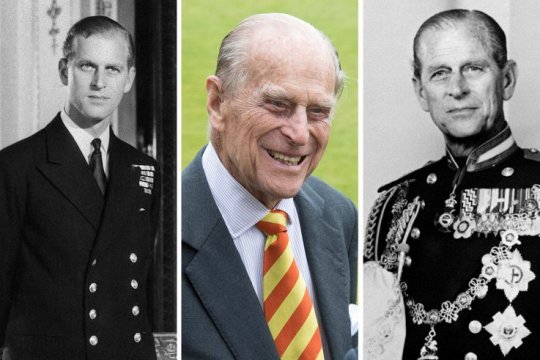
Contrary to what some might think I’m not really a fan girl when it comes to the royal family. I don’t religiously follow their every movement or utterance especially as I live in Paris and therefore I don’t really care about tabloid tittle tattle. I only get to hear of anything to do with the royal family when I speak to my parents or my great aunts and uncles for whom the subject is closer to their heart because of the services my family has rendered over past generations to the monarchy and the older (and dying) tight knit social circles they travel in.
Like Walter Bagehot, I’m more interested in the monarchy as an institution and its constitutional place within the historical, social, and political fabric of Britain and its continued delicate stabilising importance to that effect. It was Walter Bagehot, the great constitutional scholar and editor the Economist magazine, who said, “The mystic reverence, the religious allegiance, which are essential to a true monarchy, are imaginative sentiments that no legislature can manufacture in any people.” In his view, a politically-inactive monarchy served the best interests of the United Kingdom; by abstaining from direct rule, the monarch levitated above the political fray with dignity, and remained a respected personage to whom all subjects could look to as a guiding light.
Even as a staunch monarchist I freely confess that there has always been this odd nature of the relationship between hereditary monarchy and a society increasingly ambivalent about the institution. To paraphrase Bagehot again, there has been too much ‘daylight’ shone onto the ‘magic’ of the monarchy because we are obsessed with personalities as celebrities.
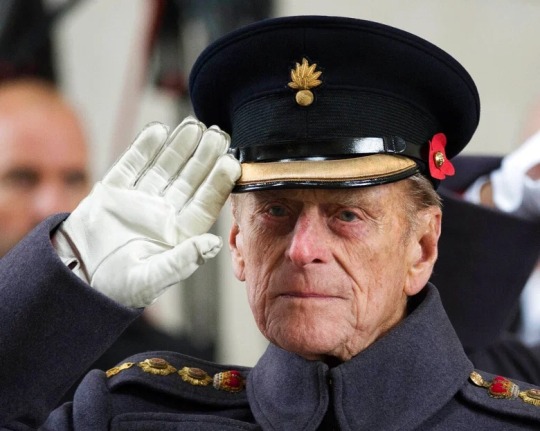
Having said that I did feel saddened by the passing of Prince Philip, the Duke of Edinburgh. After the Queen, he was my favourite royal. Anne, Princess Royal, would come next because she is very much like her father in temperament, humour, and character, so unlike her other brothers.
I have met the late Prince Philip when I was serving in the army in a few regimental meet-and-greet situations - which as you may know is pretty normal given that members of the royal family serve as honorary colonel-in-chiefs (patrons in effect) of all the British army regiments and corps.I also saw him at one or two social events such the annual charitable Royal Caledonian Ball (he’s an expert scottish reeler) and the Guards Polo Club where my older brothers played.
I’ll will freely confess that he was the one royal I could come close to identify with because his personal biography resonated with me a great deal.
Let’s be honest, the core Windsor family members, born to privilege, are conditioned and raised to be dull. Perhaps that’s a a tad harsh. I would prefer the term ‘anonymously self-effacing’, just another way of saying ‘for God’s sake don’t draw attention to yourself by saying or doing anything even mildly scandalous or political lest it invites public opprobrium and scrutiny’. The Queen magnificently succeeds in this but the others from Charles down just haven’t (with the exception of Princess Anne).
However, many people forget this obvious fact that it’s the incoming husbands and wives who marry into the Windsor family who are relied upon to bring colour and even liven things up a little. And long before Kate Middleton, Meghan Markle (very briefly), or Lady Diana Spencer, were the stars of ‘The Firm’- a phrase first coined by King George VI, Queen Elizabeth II's father who ruled from 1936 to 1952, who was thought to have wryly said, "British royals are 'not a family, we're a firm,” - it was Prince Philip who really livened things up and made the greater impact on the monarchy than any of them in the long term.

Prince Philip’s passing belied the truth of a far more complex individual: a destitute and penniless refugee Greek-Danish prince with a heart breaking backstory that could have been penned by any 19th Century novelist, and also eagle eyed reformer who tried to drag the royal family into the 20th century. At the core of the man - lost scion of a lost European royal dynasty, a courageous war veteran, and Queen’s consort - were values in which he attempted to transform and yet maintain much older inherited traditions and attitudes. Due to his great longevity, Philip’s life came to span a period of social change that is almost unprecedented, and almost no one in history viewed such a transformation from the front row.
Prince Philip would seem to represent in an acute form the best of the values of that era, which in many ways jar with today’s. He had fought with great courage in the war as a dashing young naval officer; he was regularly rude to foreigners, which was obviously a bonus to all Brits. He liked to ride and sail and shoot things. He was unsentimental almost to a comic degree, which felt reassuring at a time when a new-found emotional incontinence made many feel uncomfortable. Outrageous to some but endearing to others, he was the sort of man you’d want to go for a pint with, perhaps the ultimate compliment that an Englishman can pay to another Englishman. This has its own delicious irony as he wasn’t really an Englishman.
There are 4 takeways I would suggest in my appraisal of Prince Philip that stand out for me. So let me go through each one.
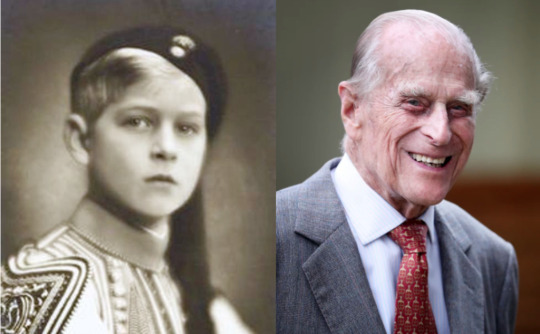
1. Prince Philip’s Internationalism
It may seem odd for me to say that Prince Philip wasn’t English but he wasn’t an Englishman in any real sense. He was a wretch of the world - stateless, homeless, and penniless. That the Prince of Nowhere became the British Monarchy’s figurehead was more than fitting for a great age of migration and transition in which the Royal Family survived and even flourished. That he was able to transform himself into the quintessential Englishman is testimony not just to his personal determination but also to the powerful cultural pull of Britishness.
He was born on a kitchen table in Corfu in June 1921. A year later in 1922, Philip, as the the great-great-grandson of Queen Victoria and nephew of Constantine I of Greece, was forced to flee with his family after the abdication of Constantine. He grew up outside Paris speaking French; ethnically he was mostly German although he considered himself Danish, his family originating from the Schleswig border region. He was in effect, despite his demeanour of Royal Navy officer briskness, a citizen of nowhere in an age of movement. From a very young age he was a stateless person, nationally homeless. Indeed, Philip was an outsider in a way that even Meghan Markle could never be; at his wedding in 1947, his three surviving sisters and two brothers-in-law were not permitted to attend because they were literally Britain’s enemies, having fought for the Germans. A third brother-in-law had even been in the SS, working directly for Himmler, but had been killed in the conflict.
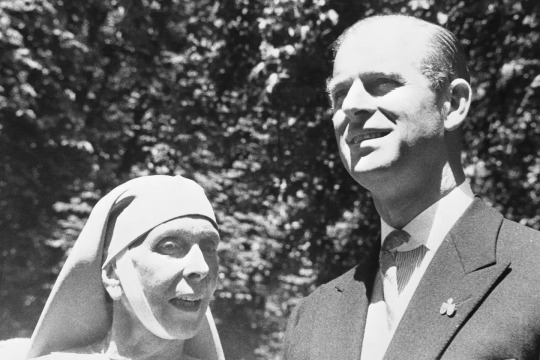
Even his religion was slightly exotic. He was Greek Orthodox until he converted to Anglicanism on marrying Elizabeth - what with his wife due to become supreme head of the Church and everything - but his ties with eastern Christianity remained. His great-aunts Princess Elisabeth of Hesse and by Rhine and Tsarina Alexandra are both martyrs of the Russian Orthodox Church, having been murdered by the Bolsheviks; Philip’s mother went on to become an Orthodox nun and a “Righteous Among the Nations” for saving a Jewish family during the Nazi occupation of Greece, spending much of her time in squalid poverty.
His parents were part of the largely German extended aristocracy who ruled almost all of Europe before it all came crashing down in 1918. When he died, aged 99, it marked a near-century in which all the great ideological struggles had been and gone; he had been born before the Soviet Union but outlived the Cold War, the War on Terror and - almost - Covid-19.
The world that Philip was born into was a far more violent and dangerous place than ours. In the year he was born, Irish rebels were still fighting Black and Tans; over the course of 12 months the Spanish and Japanese prime ministers were assassinated, there was a coup in Portugal and race riots in the United States. Germany was rocked by violence from the far-Left and far-Right, while in Italy a brutal new political movement, the Fascists, secured 30 seats in parliament, led by a trashy journalist called Benito Mussolini.
The worst violence, however, took place in Greece and Turkey. Following the defeat of the Ottoman Empire, what remained of Turkey was marked for permanent enfeeblement by the Allies. But much to everyone’s surprise the country’s force were roused by the brilliant officer Mustafa Kemal, who led the Turks to victory. Constantinople was lost to Christendom for good and thousands of years of Hellenic culture was put to the flames in Smyrna.
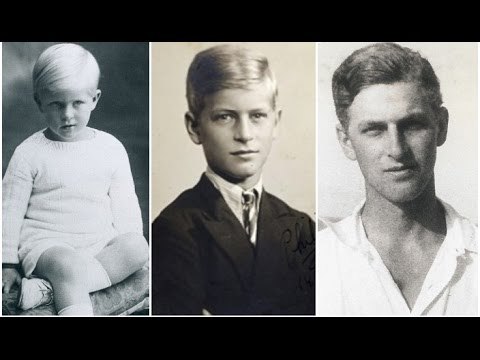
The Greek royal family, north German imports shipped in during the 19th century, bore much of the popular anger for this disaster. King Constantine fled to Italy, and his brother Andrew was arrested and only escaped execution through the intervention of his relative Britain’s George V. Andrew’s wife Alice, their four daughters and infant son Philip fled to France, completely impoverished but with the one possession that ensures that aristocrats are never truly poor: connections.
Philip had a traumatic childhood. He was forged by the turmoil of his first decade and then moulded by his schooling. His early years were spent wandering, as his place of birth ejected him, his family disintegrated and he moved from country to country, none of them ever his own. When he was just a year old, he and his family were scooped up by a British destroyer from his home on the Greek island of Corfu after his father had been condemned to death. They were deposited in Italy. One of Philip's first international journeys was spent crawling around on the floor of the train from an Italian port city, "the grubby child on the desolate train pulling out of the Brindisi night," as his older sister Sophia later described it.
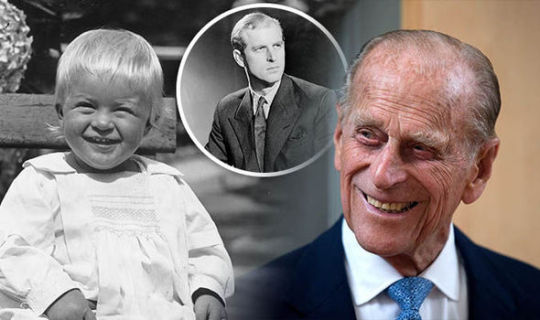
In Paris, he lived in a house borrowed from a relative; but it was not destined to become a home. In just one year, while he was at boarding school in Britain, the mental health of his mother, Princess Alice, deteriorated and she went into an asylum; his father, Prince Andrew, went off to Monte Carlo to live with his mistress. "I don't think anybody thinks I had a father," he once said. Andrew would die during the war. Philip went to Monte Carlo to pick up his father's possessions after the Germans had been driven from France; there was almost nothing left, just a couple of clothes brushes and some cuff-links.
Philip’s four sisters were all much older, and were soon all married to German aristocrats (the youngest would soon die in an aeroplane crash, along with her husband and children). His sisters became ever more embroiled in the German regime. In Scotland going to Gordonstoun boarding school, Philip went the opposite direction, becoming ever more British. Following the death of his sister Cecilie in a plane crash in 1937, the gulf widened. As the clouds of conflict gathered, the family simply disintegrated. With a flash of the flinty stoicism that many would later interpret, with no little justification, as self-reliance to the point of dispassion, the prince explained: “It’s simply what happened. The family broke up… I just had to get on with it. You do. One does.”
In the space of 10 years he had gone from a prince of Greece to a wandering, homeless, and virtually penniless boy with no-one to care for him. He got through it by making a joke of everything, and by being practical.
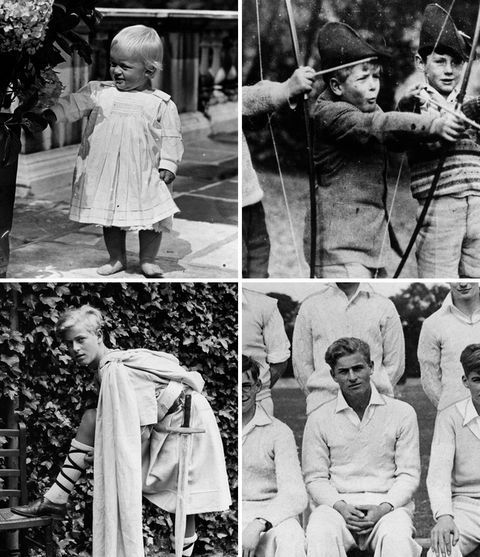
By the time he went to Gordonstoun, a private boarding school on the north coast of Scotland, Philip was tough, independent and able to fend for himself; he'd had to be. Gordonstoun would channel those traits into the school's distinct philosophy of community service, teamwork, responsibility and respect for the individual. And it sparked one of the great passions of Philip's life - his love of the sea. It was Gordonstoun that nurtured that love through the maturation of his character.
Philip adored the school as much as his son Charles would despise it. Not just because the stress it put on physical as well as mental excellence - he was a great sportsman. But because of its ethos, laid down by its founder Kurt Hahn, a Jewish exile from Nazi Germany.
Hahn first met Philip as a boy in Nazi Germany. Through a connection via one of his sister’s husbands, Philip, the poor, lonely boy was first sent off to a new school - in Nazi Germany. Which was as fun as can be imagined. Schloss Salem had been co-founded by stern educator called Kurt Hahn, a tough, discipline-obsessed conservative nationalist who saw civilisation in inexorable decline. But by this stage Hahn, persecuted for being Jewish in Nazi Germany, had fled to Britain, and Philip did not spend long at the school either, where pressure from the authorities was already making things difficult for the teachers. Philip laughed at the Nazis at first, because their salute was the same gesture the boys at his previous school had to make when they wanted to go to the toilet, but within a year he was back in England, a refugee once again.
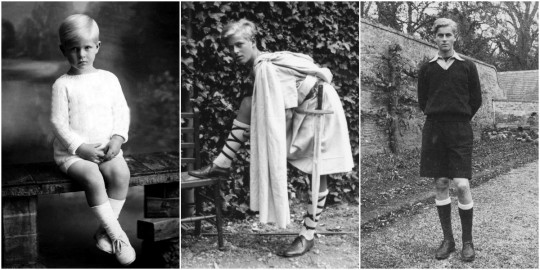
Philip happily attended Hahn’s new school, Gordonstoun, which the strict disciplinarian had set up in the Scottish Highlands. Inspired by Ancient Sparta, the boys (and then later girls) had to run around barefoot and endure cold showers, even in winter, the whole aim of which was to drive away the inevitable civilisational decay Hahn saw all around him. To 21st century ears it sounds like hell on earth, yet Philip enjoyed it, illustrating just what a totally alien world he came from.
That ethos became a significant, perhaps the significant, part of the way that Philip believed life should be lived. It shines through the speeches he gave later in his life. "The essence of freedom," he would say in Ghana in 1958, "is discipline and self-control." The comforts of the post-war era, he told the British Schools Exploring Society a year earlier, may be important "but it is much more important that the human spirit should not be stifled by easy living". And two years before that, he spoke to the boys of Ipswich School of the moral as well as material imperatives of life, with the "importance of the individual" as the "guiding principle of our society".
It was at Gordonstoun one of the great contradictions of Philip's fascinating life was born. The importance of the individual was what in Kurt Hahn's eyes differentiated Britain and liberal democracies from the kind of totalitarian dictatorship that he had fled. Philip put that centrality of the individual, and individual agency - the ability we have as humans to make our own moral and ethical decisions - at the heart of his philosophy.

At Dartmouth Naval College in 1939, the two great passions of his life would collide. He had learned to sail at Gordonstoun; he would learn to lead at Dartmouth. And his driving desire to achieve, and to win, would shine through. Despite entering the college far later than most other cadets, he would graduate top of his class in 1940. In further training at Portsmouth, he gained the top grade in four out of five sections of the exam. He became one of the youngest first lieutenants in the Royal Navy.
The navy ran deep in his family. His maternal grandfather had been the First Sea Lord, the commander of the Royal Navy; his uncle, "Dickie" Mountbatten, had command of a destroyer while Philip was in training. In war, he showed not only bravery but guile. It was his natural milieu. "Prince Philip", wrote Gordonstoun headmaster Kurt Hahn admiringly, "will make his mark in any profession where he will have to prove himself in a trial of strength".
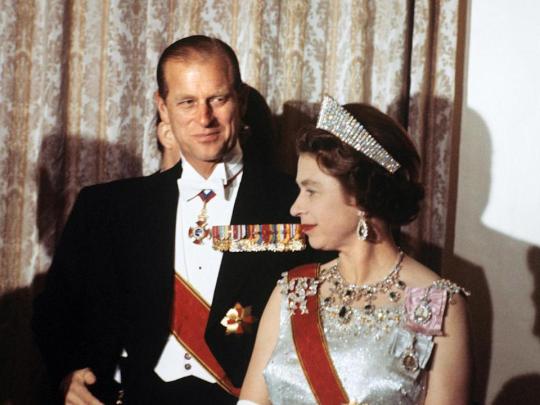
2. Prince Philip and the modernisation of the monarchy
In his own words, the process of defining what it meant to be a royal consort was one of “trial and error.” Speaking with BBC One’s Fiona Bruce in 2011, Philip explained, “There was no precedent. If I asked somebody, 'What do you expect me to do?' they all looked blank. They had no bloody idea, nobody had much idea.” So he forged for himself a role as a moderniser of the monarchy.
He could not have had much idea back in 1939. Back then in Dartmouth in 1939, as war became ever more certain, the navy was his destiny. He had fallen in love with the sea itself. "It is an extraordinary master or mistress," he would say later, "it has such extraordinary moods." But a rival to the sea would come.
When King George VI toured Dartmouth Naval College, accompanied by Philip's uncle, he brought with him his daughter, Princess Elizabeth. Philip was asked to look after her. He showed off to her, vaulting the nets of the tennis court in the grounds of the college. He was confident, outgoing, strikingly handsome, of royal blood if without a throne. She was beautiful, a little sheltered, a little serious, and very smitten by Philip.
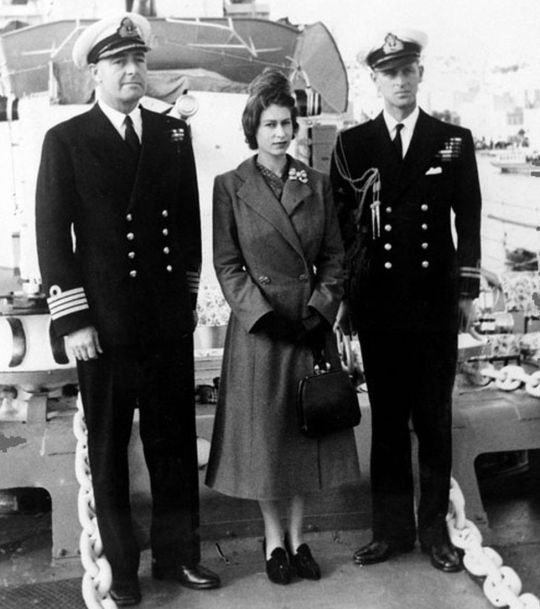
Did he know then that this was a collision of two great passions? That he could not have the sea and the beautiful young woman? For a time after their wedding in 1948, he did have both. As young newlyweds in Malta, he had what he so prized - command of a ship - and they had two idyllic years together. But the illness and then early death of King George VI brought it all to an end.
He knew what it meant, the moment he was told. Up in a lodge in Kenya, touring Africa, with Princess Elizabeth in place of the King, Philip was told first of the monarch's death in February 1952. He looked, said his equerry Mike Parker, "as if a ton of bricks had fallen on him". For some time he sat, slumped in a chair, a newspaper covering his head and chest. His princess had become the Queen. His world had changed irrevocably.

While the late Princess Diana was later to famously claim that there were “three people” in her marriage - herself, Prince Charles and Camilla - there were at least 55 million in Philip and Elizabeth’s. As Elizabeth dedicated her life to her people at Westminster Abbey at the Coronation on June 2, 1953, it sparked something of an existential crisis in Philip. Many people even after his death have never really understood this pivotal moment in Philip’s life. All his dreams of being a naval officer and a life at sea as well as being the primary provider and partner in his marriage were now sacrificed on the altar of duty and love.
With his career was now over, and he was now destined to become the spare part. Philip, very reasonably, asked that his future children and indeed his family be known by his name, Mountbatten. In effect he was asking to change the royal family’s name from the House of Windsor to the House of Mountbatten. But when Prime Minister Winston Churchill got wind of it as well as the more politically agile courtiers behind the Queen, a prolonged battle of wits ensued, and it was one Philip ultimately lost. It was only in 1957 that he accepted the title of “Prince.”
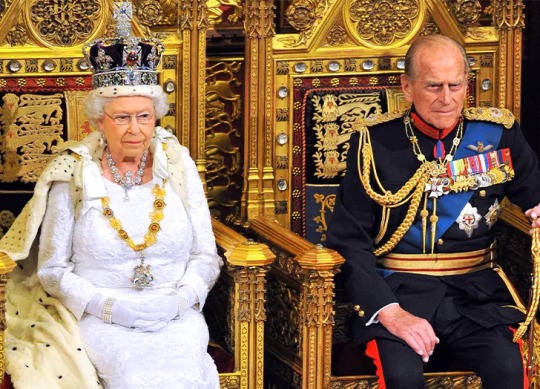
Even though he had almost lost everything dear to him and his role now undefined, he didn’t throw himself a pity party. He just got on with it. Philip tried to forge his own distinct role as second fiddle to the woman who had come to represent Great Britain. He designated himself the First Officer of the Good Ship Windsor. He set about dusting off some of the cobwebs off the throne and letting some daylight unto the workings of the monarchy by advocating reasonable amount of modernisation of the monarchy.
He had ideas about modernising the royal family that might be called “improving optics” today. But in his heart of hearts he didn’t want the monarchy to become a stuffy museum piece. He envisaged a less stuffy and more popular monarchy, relevant to the lives of ordinary people. Progress was always going to be incremental as he had sturdy opposition from the old guard who wanted to keep everything as it was, but nevertheless his stubborn energy resulted in significant changes.
When a commission chaired by Prince Philip proposed broadcasting the 1953 investiture ceremony that formally named Elizabeth II as queen on live television, Prime Minister Winston Churchill reacted with outright horror, declaring, “It would be unfitting that the whole ceremony should be presented as if it were a theatrical performance.” Though the queen had initially voiced similar concerns, she eventually came around to the idea, allowing the broadcast of all but one segment of the coronation. Ultimately, according to the BBC, more than 20 million people tuned in to the televised ceremony - a credit to the foresight of Philip.
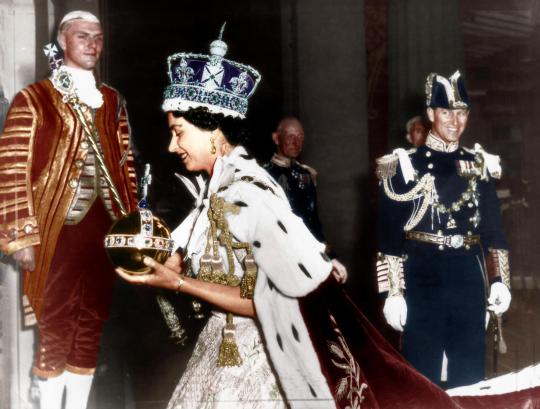
Elizabeth’s coronation marked a watershed moment for a monarchy that has, historically, been very hands off, old-fashioned and slightly invisible. Over the following years, the royals continued to embrace television as a way of connecting with the British people: In 1957, the queen delivered her annual Christmas address during a live broadcast. Again, this was Philip’s doing when he cajoled the Queen to televise her message live. He even helped her in how to use the teleprompter to get over her nerves and be herself on screen.
Four years later, in 1961, Philip became the first family member to sit for a television interview. It is hard for us to imagine now but back then it was huge. For many it was a significant step in modernising the monarchy.
Though not everything went to plan. Toward the end of the decade, the Windsors even invited cameras into their home. A 1969 BBC fly-on-the-wall documentary, instigated by Philip to show life behind the scenes, turned into an unmitigated disaster: “The Windsors” revealed the royals to be a fairly normal, if very rich, British upper-class family who liked barbecues, ice cream, watching television and bickering. The mystery of royalty took a hit below the waterline from their own torpedo, a self-inflicted wound from which they took a long time to recover. Shown once, the documentary was never aired again. But it had an irreversible effect, and not just by revealing the royals to be ordinary. By allowing the cameras in, Philip opened the lid to the prying eyes of the paparazzi who could legitimately argue that since the Royals themselves had sanctioned exposure, anything went. From then on, minor members of the House of Windsor were picked off by the press, like helpless tethered animals on a hunting safari.
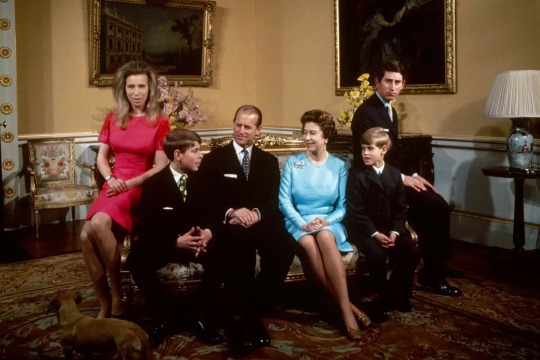
Prince Philip also took steps to reorganise and renovate the royal estates in Sandringham and Balmoral such as intercoms, modern dish washers, generally sought to make the royal household and the monarchy less stuffy, not to have so much formality everywhere.
Philip helped modernised the monarchy in other ways to acknowledge that the monarchy could be responsive to changes in society. It was Prince Philip - much to the chagrin of the haughty Princess Margaret and other stuffy old courtiers - who persuaded the Queen to host informal lunches and garden parties designed to engage a broader swath of the British public. Conversely, Prince Philip heartily encouraged the Queen (she was all for it apparently but was still finding her feet as a new monarch) to end the traditional practice of presenting debutantes from aristocratic backgrounds at court in 1952. For Philip and others it felt antiquated and out of touch with society. I know in speaking to my grandmother and others in her generation the decision was received with disbelief at how this foreign penniless upstart could come and stomp on the dreams of mothers left to clutch their pearls at the prospect there would be no shop window for their daughter to attract a suitable gentleman for marriage. One of my great aunts was over the moon happy that she never would have to go through what she saw as a very silly ceremony because she preferred her muddy wellies to high heels.

A former senior member of the royal household, who spent several years working as one of Prince Philip’s aides, and an old family friend, once told us around a family dinner table that the Duke of Edinburgh was undoubtedly given a sense of permanence by his marriage into the Royal Family that was missing from earlier years. But the royal aide would hastily add that Prince Philip, of course, would never see it that way.
Prince Philip’s attitude was to never brood on things or seek excuses. And he did indeed get on with the job in his own way - there should be no doubt that when it came to building and strengthening the Royal Family it was a partnership of equals with the Queen. Indeed contrary to Netflix’s hugely popular series ‘The Crown’ and its depiction of the royal marriage with Philip’s resentment at playing second fiddle, the prince recognised that his “first duty was to serve the Queen in the best way I could,” as he told ITV in 2011. Though this role was somewhat ill-suited to his dynamic, driven, and outspoken temperament, Philip performed it with utter devotion.

3. Prince Philip’s legacy
One could argue rightly that modernising the monarchy was his lasting legacy achievement. But he also tried to modernise a spent and exhausted Britain as it emerged from a ruinous war. When peace came, and with it eventual economic recovery, Philip would throw himself into the construction of a better Britain, urging the country to adopt scientific methods, embracing the ideas of industrial design, planning, education and training. A decade before Harold Wilson talked of the "white heat of the technological revolution", Philip was urging modernity on the nation in speeches and interviews. He was on top of his reading of the latest scientific breakthroughs and well read in break out innovations.
This interest in modernisation was only matched by his love for nature. As the country and the world became richer and consumed ever more, Philip warned of the impact on the environment, well before it was even vaguely fashionable. As president of the World Wildlife Fund (WWF) in the UK for more than 20 years from 1961, he was one of the first high-profile advocates of the cause of conservation and biological diversity at a time when it was considered the preserve of an eccentric few.
For a generation of school children in Britain and the Commonwealth though, his most lasting legacy and achievement will be the Duke of Edinburgh Awards (DofE). He set up the Duke of Edinburgh award, a scheme aimed at getting young people out into nature in search of adventure or be of service to their communities. It was a scheme that could match the legacy of Baden Powell’s scouts movement.
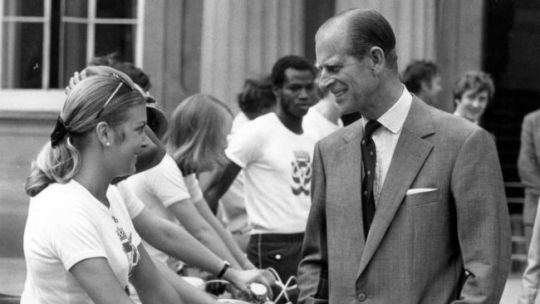
When Prince Philip first outlined his idea of a scheme to harness the values of his education at Gordonstoun by bringing character-building outdoor pursuits to the many rather than the fee-paying few, he received short shrift from the government of the day. The then minister of education, Sir David Eccles responded to the Duke’s proposal by saying: “I hear you’re trying to invent something like the Hitler Youth.” Undeterred he pushed on until it came to fruition.
I’m so glad that he did. I remember how proud I was for getting my DofE Awards while I was at boarding school. With the support of great mentors I managed to achieve my goals: collecting second-hand English books for a literacy programme for orphaned street children in Delhi, India with a close Indian school friend and her family; and completing a 350 mile hike following St. Olav’s Pilgrimmage Trail from Selånger, on the east coast of Sweden, and ending at Nidaros Cathedral in Trondheim, on the west coast of Norway.
It continues to be an enduring legacy. Since its launch in 1956, the Duke of Edinburgh awards have been bestowed upon some 2.5 million youngsters in Britain and some eight million worldwide. For a man who once referred to himself as a “Greek princeling of no consequence”, his pioneering tutelage of these two organisations (alongside some 778 other organisations of which he was either president or a patron) would be sufficient legacy for most.
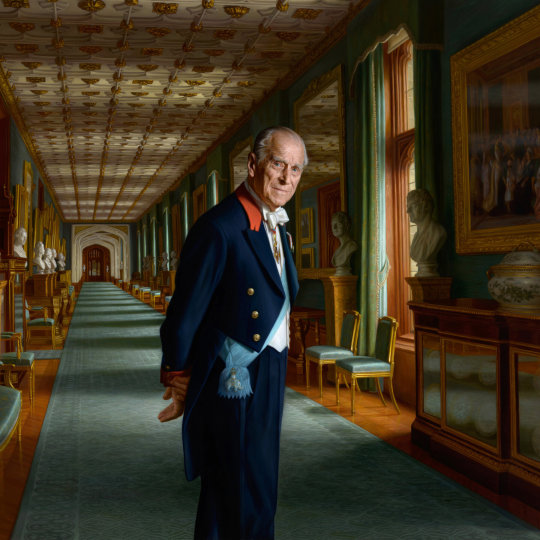
4. Prince Philip’s character
It may surprise some but what I liked most about Prince Philip was the very thing that helped him achieve so much and leave a lasting legacy: his character.
It is unhelpful to the caricature of Prince Philip as an unwavering but pugnacious consort whose chief talent was a dizzying facility in off-colour one-liners that he was widely read and probably the cleverest member of his family.
His private library at Windsor consists of 11,000 tomes, among them 200 volumes of poetry. He was a fan of Jung, TS Eliot, Shakespeare and the cookery writer Elizabeth David. As well as a lifelong fascination with science, technology and sport, he spoke fairly fluent French, painted and wrote a well received book on birds. It’s maddening to think how many underestimated his genuine intellect and how cultured he was behind the crusty exterior.
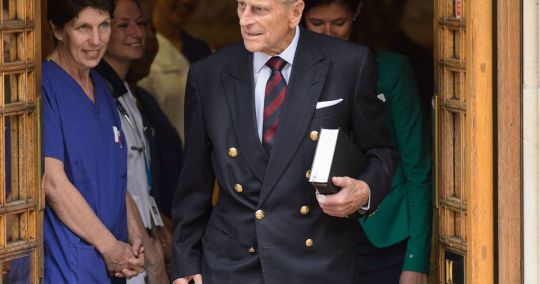
He didn’t have an entourage to fawn around him. He was the first to own a computer at Buckingham Palace. He answered his own phone and wrote and responded to his own correspondence. By force of character he fought the old guard courtiers at every turn to modernise the monarchy against their stubborn resistance.
Prince Philip was never given to self-analysis or reflection on the past. Various television interviewers tried without success to coerce him in to commenting on his legacy.But once when his guard was down he asked on the occasion of his 90th birthday what he was more proud of, he replied with characteristic bluntness: “I couldn’t care less. Who cares what I think about it, I mean it’s ridiculous.”
All of which neatly raises the profound aversion to fuss and the proclivity for tetchiness often expressed in withering put-downs that, for better or worse, will be the reflex memory for many of the Duke of Edinburgh. If character is a two edged sword so what of his gaffes?
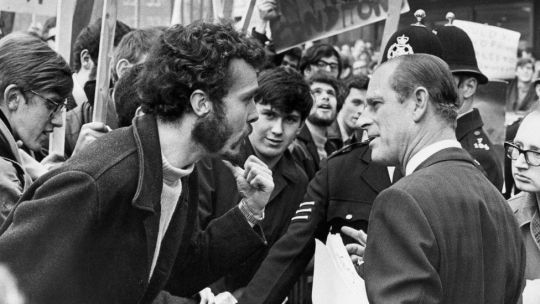
There is no doubt his cult status partly owed to his so-called legendary gaffes, of which there are enough to fill a book (indeed there is a book). But he was no racist. None of the Commonwealth people or foreign heads of state ever said this about him. Only leftist republicans with too much Twitter time on their hands screamed such a ridiculous accusation. They’re just overly sensitive snowflakes and being devoid of any humour they’re easily triggered.
There was the time that Philip accepted a gift from a local in Kenya, telling her she was a kind woman, and then adding: “You are a woman, aren’t you?” Or the occasion he remarked “You managed not to get eaten, then?” to a student trekking in Papua New Guinea. Then there was his World Wildlife Fund speech in 1986, when he said: “If it has got four legs and it is not a chair, if it has got two wings and it flies but is not an aeroplane, and if it swims and it is not a submarine, the Cantonese will eat it.” Well, he wasn’t wrong.

Philip quickly developed a reputation for what he once defined, to the General Dental Council, as “dentopedology – the science of opening your mouth and putting your foot in it”. Clearly he could laugh at himself as he often did as an ice breaker to put others at ease.
His remarking to the president of Nigeria, who was wearing national dress, “You look like you’re ready for bed”, or advising British students in China not to stay too long or they would end up with “slitty eyes”, is probably best written off as ill-judged humour. Telling a photographer to “just take the fucking picture” or declaring “this thing open, whatever it is”, were expressions of exasperation or weariness with which anyone might sympathise.
Above all, he was also capable of genuine if earthy wit, saying of his horse-loving daughter Princess Anne: “If it doesn’t fart or eat hay she isn’t interested.” Many people might have thought it but few dared say it. If Prince Philip’s famous gaffes provoked as much amusement as anger, it was precisely because they seem to give voice to the bewilderment and pent-up frustrations with which many people viewed the ever-changing modern world.

A former royal protection officer recounts how while on night duty guarding a visiting Queen and consort, he engaged in conversation with colleagues on a passing patrol. It was 2am and the officer had understood the royal couple to be staying elsewhere in the building until a window above his head was abruptly slammed open and an irate Prince Philip stuck his head out of the window to shout: “Would you fuck off!” Without another word, he then shut the window.
The Duke at least recognised from an early age that he was possessed of an abruptness that could all too easily cross the line from the refreshingly salty to crass effrontery.
One of his most perceptive biographers, Philip Eade, recounted how at the age of 21 the prince wrote a letter to a relation whose son had recently been killed in combat. He wrote: “I know you will never think much of me. I am rude and unmannerly and I say things out of turn which I realise afterwards must have hurt someone. Then I am filled with remorse and I try to put matters right.”
In the case of the royal protection officer, the Duke turned up in the room used by the police officers when off duty and said: “Terribly sorry about last night, wasn’t quite feeling myself.”
Aides have also ventured to explain away some of their employer’s more outlandish remarks - from asking Cayman islanders “You are descended from pirates aren’t you?” to enquiring of a female fashion writer if she was wearing mink knickers - as the price of his instinctive desire to prick the pomposity of his presence with a quip to put others at ease.

Indeed many people forget that his ‘gaffes’ were more typical of the clubbish humour of the British officer class – which of course would be less appreciated, sometimes even offensive, to other ears. It’s why he could relate so well to veterans who enjoyed his bonhomie company immensely.
But behind the irascibility, some have argued there also lay a darker nature, unpleasantly distilled in his flinty attitude to his eldest son. One anecdote tells of how, in the aftermath of the murder of the Duke’s uncle and surrogate father, Lord Mountbatten, Philip lectured his son, who was also extremely fond of his “honorary grandfather”, that he was not to succumb to self-pity. Charles left the room in tears and when his father was asked why he had spoken to his son with so little compassion, the Duke replied: “Because if there’s any crying to be done I want it to happen within this house, in front of his family, not in public. He must be toughened up, right now.”
But here I would say that Prince Philip’s intentions were almost always sincere and in no way cruel. He has always tried to protect his family - even from their own worst selves or from those outside the family ‘firm’ who may not have their best interest at heart.
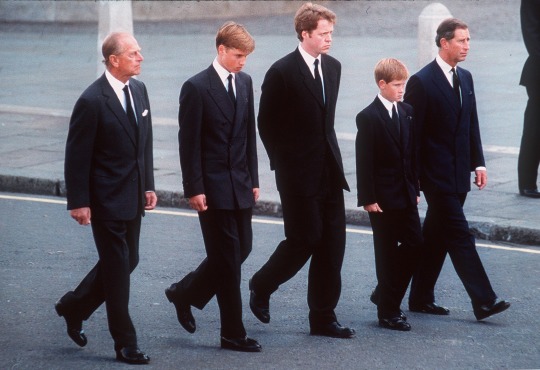
In 1937, a 16-year-old Prince Philip had walked behind his elder sister Cecile’s coffin after she was killed in a plane crash while heavily pregnant. The remains of newly-born infant found in the wreckage suggested the aircraft had perished as the pilot sought to make an emergency landing in fog as the mother entered childbirth. It was an excruciating taste of tragedy which would one day manifest itself in a very princely form of kindness that was deep down that defined Philip’s character.
When about 60 years later Prime Minister Tony Blair’s spin doctors in Downing Street tried to strong arm the Queen and the royal household over the the arrangements for the late Prince Diana’s funeral, it was Philip who stepped in front to protect his family. The Prime Minister and his media savvy spin doctors wanted the two young princes, William and Harry, to walk behind the coffin.
The infamous exchange was on the phone during a conference call between London and Balmoral, and the emotional Philip was reportedly backed by the Queen. The call was witnessed by Anji Hunter, who worked for Mr Blair. She said how surprised she was to hear Prince Philip’s emotion. ‘It’s about the boys,” he cried, “They’ve lost their mother”. Hunter thought to herself, “My God, there’s a bit of suffering going on up there”.’
Sky TV political commentator Adam Boulton (Anji Hunter’s husband) would write in his book Tony’s Ten Years: ‘The Queen relished the moment when Philip bellowed over the speakerphone from Balmoral, “Fuck off. We are talking about two boys who have just lost their mother”. Boulton goes on to say that Philip: ‘…was trying to remind everyone that human feelings were involved. No 10 were trying to help the Royals present things in the best way, but may have seemed insensitive.’

In the end the politicians almost didn’t get their way. Prince Philip stepped in to counsel his grandson, Prince William, after he had expressed a reluctance to follow his mother’s coffin after her death in Paris. Philip told the grieving child: “If you don’t walk, I think you’ll regret it later. If I walk, will you walk with me?”
It’s no wonder he was sought as a counsellor by other senior royals and especially close to his grandchildren, for whom he was a firm favourite. His relationship with Harry was said to have become strained, however, following the younger Prince’s decision to reject his royal inheritance for a life away from the public eye in America with his new American wife, Meghan Markle. For Prince Philip I am quite sure it went against all the elder Prince had lived his life by - self-sacrifice for the greater cause of royalty.
This is the key to Philip’s character and in understanding the man. The ingrained habits of a lifetime of duty and service in one form or another were never far away.

In conclusion then....
After more time passes I am sure historians will make a richer reassessment of Prince Philip’s life and legacy. Because Prince Philip was an extraordinary man who lived an extraordinary life; a life intimately connected with the sweeping changes of our turbulent 20th Century, a life of fascinating contrast and contradiction, of service and some degree of solitude. A complex, clever, eternally restless man that not even the suffocating protocols of royalty and tradition could bind him.
Although he fully accepted the limitations of public royal service, he did not see this as any reason for passive self-abnegation, but actively, if ironically, identified with his potentially undignified role. It is this bold and humorous embrace of fated restriction which many now find irksome: one is no longer supposed to mix public performance with private self-expression in quite this manner.
Yet such a mix is authentically Socratic: the proof that the doing of one’s duty can also be the way of self-fulfilment. The Duke’s sacrifice of career to romance and ceremonial office is all the more impressive for his not hiding some annoyance. The combination of his restless temperament and his deeply felt devotion to duty found fruitful expression; for instance, in the work of Saint George’s House Windsor - a centre and retreat that he created with Revd. Robin Woods - in exploring religious faith, philosophy, and contemporary issues.
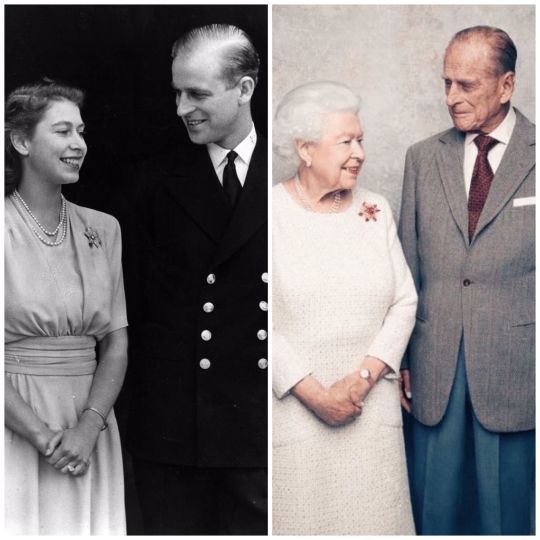
Above all he developed a way to be male that was both traditional and modern. He served one woman with chivalric devotion as his main task in life while fulfilling his public engagements in a bold and active spirit. He eventually embraced the opportunity to read and contemplate more. And yet, he remained loyal to the imperatives of his mentor Kurt Hahn in seeking to combine imagination with action and religious devotion with practical involvement.
Prince Philip took more pride in the roles he had accidentally inherited than in the personal gifts which he was never able fully to develop. He put companionship before self-realisation and acceptance of a sacred symbolic destiny before the mere influencing of events. In all these respects he implicitly rebuked our prevailing meritocracy which over-values officially accredited attainment, and our prevailing narcissism which valorises the assertion of discrete identities.

Prince Philip was Britain’s longest-serving consort. He was steadfast, duty driven, and a necessary adjunct to the continuity and stability of the Queen and the monarchy. Of all the institutions that have lost the faith of the British public in this period - the Church, Parliament, the media, the police - the Monarchy itself has surprisingly done better than most at surviving, curiously well-adapted to a period of societal change and moral anarchy. The House of Hanover and later Saxe-Coburg and Gotha (changed to Windsor), since their arrival in this country in 1714, have been noted above all for their ability to adapt. And just as they survived the Victorian age by transforming themselves into the bourgeoise, domestic ideal, so they have survived the new Elizabethan era (Harry-Meghan saga is just a passing blip like the Edward-Wallis Simpson saga of the 1930s).
There was once a time when the Royal’s German blood was a punchline for crude and xenophobic satirists. Now it is the royals who are deeply British while the country itself is increasingly cosmopolitan and globalised. British society has seen a greater demographic change than the preceding four or five thousand years combined, the second Elizabethan age has been characterised more than anything by a transformational movement of people. Prince Philip, the Greek-born, Danish-German persecuted and destitute wanderer who came to become one of the Greatest Britons of the past century, perhaps epitomised that era better than anyone else. And he got through it by making a joke of everything, and by being practical.
I hope I don’t exaggerate when I say that in our troubled times over identity, and our place and purpose in the world, we need to heed his selfless example more than ever.

As Heraclitus wisely said, Ήθος ανθρώπω δαίμων (Character is destiny.)
RIP Prince Philip. You were my prince. God damn you, I miss you already.
Thanks for your question.
#question#ask#prince philip#duke of edinburgh#queen elizabeth II#the queen of spades#monarchy#britain#british#royalty#politics#history#culture#europe#crown#icon#great briton#society
284 notes
·
View notes
Text

-View of Constantinople by evening light-
45 notes
·
View notes
Text
Mun Mermaid explains further why she loves SwissGre
Okay so i hope this won't be taken down for "hate speech". I will explain further why i love SwissGre so much. If you don't like this ship , don't bash on it, just ignore this post.
Why i ship it
The two countries have excellent historical and diplomatical relationships. Switzerland was one of the nations who supported Greece during the Revolution against Turkey in 1821 . Their relations still remain warm even nowadays and they are very close. Switzerland and Greece developed diplomatic relations after the second one's independence in 1830.
History
It may be unbeliavable but the relations between Switzerland and Greece actually began from the Ancient times. In Bern, a bronze amphora with a Greek inscription (6th century BC) is discovered. Presence of Greek vessels in Lenzburg (canton of Aargau) is suspected on the spot production by Greek craftsmen, while ancient coins with the head of Artemis are discovered in Icino.
Greek coins of the 4th century B.C. contacts Switzerland's relations with Greece and the participation of Swiss in Macedonian troops. The 2nd century B.C. stoic philosopher Posidonious of Rhodes likens the Helvetian Celts to the Gaul warriors. According to Strabo(1st century B.C.) they are described as gold-rich and peaceful.
Julius Caesar reported that the Helvetian Celts borrowed and used Greek letters for their writing.Funerary monuments bearing Greek characters are described by the Roman historian Tacitus.
Archaeological excavations in the canton of Valais brought to the light two Parian marble statues of the gods Apollo and Aphrodite which are now exhibited in the Martigny Giannda Foundation.
The Swiss city Basel is first mentioned with its Greek origin name as early as 374 A.D. (Derived from the Greek given name Basilius).
The relations of these two countries continued even in the Byzantine and medieval eras. Various objects (such as diptychs and icons) travel from church to church and monastery to monastery. Valuable information can be found in the library bearing the Greek inscription “Ψυχής Ιατρείον” (meaning “healing of the soul”), at the St. Gallen Abbey, the St. Maurice Abbey, the Sion Valère Museum, the Zurich National Museum and others. Swiss warriors and knights were known to defend various Greek regions like Rhodes, Crete, Euboa and the Peloponeso from the Turks after the fall of Constantinople. Those men were distinguished for their skills in warfare.
In Switzerland the interest for the Greek History and Culture still remained unchanged during the Renaissance era with Basel being the epicenter and the spiritual ties with the wisdom of the ancient Greek world are reinstated ever more. In particular, after the Fall of Constantinople, the Greek spiritual heritage inspires the Humanists (Erasmus) and the Protestant Reformation. The exchange of views between the Patriarch of Constantinople Cyril Loukaris (1572 - 1638) and the Geneva Academia theology Professor Antoine Léger (1596 - 1661) is illustrated in a series of manuscripts.
The remarkable contribution of Franciscus Portus, born in Rethymno, Creta, and a Calvin’s friend, is worth mentioning. He taught Greek at the then newly established Geneva Academy (1562 - 1581) and vigorously defended the modern Greek, against the Erasmian pronunciation. His work was taken over by his son, Emil.
In the field of visual arts, Swiss painters Angelica Kauffman and Johann Heinrich Füssli (alias Henry Fuseli (famous for his work Reflections On the Painting and Sculpture of the Greeks, 1765) had their role to play in the 18th century Neoclassicism movement.
Ugo Foscolo the national poet of Italy, who was born in Zakynthos was persecuted for his democratic ideas and passed into Zurich(1813-1816). In 1816 he met with his disciple Andreas Calvos, the Greek poet, and both, thanks to the assistance of Kapodistrias departed for London.
The first governor of Greece Ioannis Kapodistrias is considered as a national hero in Switzerland because he introduced the Swiss neutrality and the creation of the Swiss cantons. The governing model of this country is based on the Ancient Athenian democracy as well.
According to historical sources Kapodistrias spend two distinctive periods of his life in Switzerland : the first during the Congress of Vienna between 1813-1824 and the second one during the Greek Revolution from 1822 to 1827.
Kapodistrias decisively contributed, first as an envoy of Tsar Alexander I and then as his Ambassador, in preparing the Swiss Constitution, but also in recognizing the independence and neutrality of the Swiss Confederation (1813-1814). On 10.09.1814 he writes to his father: “... the completion of such a complicated negotiation has cost me a lot of suffering, travelling, writing and giving speeches and preparing constitutions and drafts, but it does not matter. These brilliant people (the Swiss) filled me with their friendship and wholehearted warmness. The trust they showed me was the best reward for all my sufferings. If they can be happy in the future and enjoy their independence, I will say that I didn't waste my time and my efforts.”
A year later, while attending the Vienna Congress as Minister for Foreign Affairs of the Russian Empirer for the Eastern question, Kapodistrias met with the Swiss envoy, and a friend of his, Pictet de Rochemont, who was accompanied by his nephew and benefactor of Greece, Jean Gabriel Eynard. Pictet de Rochemont, in one of his letters from Vienna to his Swiss compatriots writes:
"what can we do for Kapodistrias, this excellent person. He is the Phoenix of Democracy. Without his contribution the Vienna Congress and the rest would have been different. I am convinced that without him Switzerland would have been completely overthrown. If he ever passes from Geneva, you should ring all the bells of our churches and welcome his arrival with the thunder of our artillery. "
Upon his return to Geneva and Lausanne in 1822, the two cantons of Geneva and Vaud declared him an honorable fellow citizen. Kapodistrias remained in Switzerland until 1827, where he was working tirelessly and inspired Swiss philhellenism.
The President of the Swiss Confederation, in his speech in Sochi, Russia, on the occasion of the 2014 Winter Olympics, made an explicit tribute to the great Greek diplomat and his contribution to his country's independence and neutrality.
Many Swiss helped during the Greek Revolution in 1821 against Turkey already from its beginning. One example was Johann Jakob Meyer, doctor and owner of the first Greek newspaper. He sacraficed his life fighting the Turks in Missolonghi. He was also married to a Greek woman and became Orthodox.
The first Philhellenic Club of Europe was founded in Bern, Switzerland during the Revolution of 1821.
The Swiss banker and diplomat Jean Gabriel Eynard was a great supporter of the Greek Revolution and a benefactor of Greece. He had a close friendship with Ioannis Kapodistrias the first governor of Greece after its independence.
Switzerland was also one of the first nations to develop diplomatical relations with Greece after the second one's independence in 1830.
Inspired by the Greek civilization, Johann-Jakob Bachofen, a great philosopher and professor from Basel, visited Greece in the mid-19th century. Later, he wrote an in-depth study on the ancient funerary monuments. Jacob Burckhardt, also born in Basel, a scholar and art historian, was deeply interested in the Greek civilization (1898 - 1902). Of great interest is the correspondence between Burckhardt and his fellow Professor in Basel University, the philosopher Friedrich Nietzsche. Nietzsche spent ten years in Basel teaching ancient Greek literature and philosophy in Basel, and leaving in the city’s fertile and free-spirited academic environment, wrote his Birth of Tragedy (1872) and his Philosophy in the Tragic Age of the Greeks (1873), two major works that revolutionised the studies on classic Greek culture.
Before them travellers, scholars, architects and archaeologists (Paul Schazmann (1871-1946) and Ernst Robert Fiechter (Basel, 1875 – St. Gallen, 1948) topographers, historians (University Professor and politician Wilhelm Vischer-Bilfinger, Basel, 1833-1886), as well as landlords, and entrepreneurs, were settled in Northern Euboea, after the Independence (Koulouri, Marouli, Ayyanako, Artemisio, Geraki, Istiea). Most of them coming from well-known Bernese families: Carlo Leutwein, Karl von Müller (Emmanuel von Fellenberg's grooms), Friedrich von Fellenberg (son of Emmanuel), Rudolf von Wild together with their British friend Edward Noel, a Lord Byron’s nephew.
Botanists (Alphonse de Candolle, Henri Margot, the prominent Edmond Boissier, 19th century, Martin Rikli, and Gustave Beauverd, 20th century) meticulously documented the Greek flora.
Swiss artist and archaeological draftsman Emile Gilliéron (1850–1924) lived in Greece and is best known for his work on polychromic Minoan and Mycenaean artifacts and produced copies. Henri-Max Imhof from Uri, appointed as professor at the Art Academy in Athens, where he also dealt with the restoration of excavated antiquities and the caryatids of the Erechtheion, the painter Jean Leu, Jean-Jacques Wolfensberger from Rümlikon, Frank Buchser from Solothurn and the famous Arnold Böcklin from Basel (his well-known painting "Isle of the Dead" is inspired by the islet of Pontikonisi near Corfu). Later, the painter Otto Haberer-Sinner was inspired by Greek themes (wall-paintings at the Bellevue Bern Hotel, 1913).
Moreover, the unique panoramic work of the Swiss painter Edward Castres (1881) in Lucerne, depicting the overwhelmed French army, under the command of the French general, and Greek descend, Charles Denis Sauter Bourbaki, who took refuge in Switzerland (1871) persecuted by the Prussians. The crossing of Switzerland by the exhausted soldiers is today also depicted in a panorama in the city of Verrières / Parcour Bourbaki). Charles Bourbaki was the son of the legendary 1821 Revolution fighter, Colonel Constantin Denis Bourbaki, who heroically fell in the murderous battle of Kamatero (January 1827). In 1862 his name figured as candidate for the Greek Crown, but he declined the offer. The Bourbaki family from Sfakia, Crete, has excelled in the French army and holds a prominent position in the Pantheon of the Philhellenes.
Archaeologists as well as photographers arrived in Greece in the early 20th century. The first Swiss archaeologist to join the French School (1902-1903) was Georges Nicole from Geneva, and was followed by Waldemar Deonna (in Delos), Olivier Reverdin and Christiane Dunant. Alos worth mentioning is the contribution made by the Swiss Paul Collart, who participated in the French Archaeological School’s excavations, in Philippi.
The contribution of the great photographer Frédéric Boissonas was remarkable. Together with his friend Daniel Beaud-Bovy, a writer and director in the Geneva School of Fine Arts, frequently visited Greece and uniquely immortalized the Greek landscape at the beginning of the 20th century, 1903 - 1935 (see related collectibles, 1910, 1919 & 1932). Beaud-Bovy's grandson, Manuel, donated to the Photography Museum of Thessaloniki a complete archive of 13,000 photographic items, letters and publications from their voyages to Greece. The rest of the Swiss photographer's archive was recently purchased by the municipality of Geneva.
Always worth mentioning is the work of Professor in geology Charles Renz, (first half of the 20th century). Besides, the Swiss were also the first to explore Mount Olympus (alpinist Marcel Kurz from Neuchâtel, 1921).
At the beginning of the 20th century, Professor of Philosophy and Sociology Avrotelis Eleftheropoulos (1869-1963) taught at Zurich University. Always in Zurich, where statues of Ganymede and Hercules can be seen in public places, an Association is founded in 1875 by the numerous Greek community living there. In Athens they became known as the "Zurich Circle", and pioneered in the foundation of the Association of Greek Industrialists (1907). Nikos Kazantzakis visited the Alps in 1917 - 1918 (Zurich, Lugano, etc.) and returned there in 1955 to start writing his Report to Greco (Cademario, Ticino).
Also remarkable remains the contribution of the Swiss Red Cross to Greece after the 1922 disaster in Asia Minor, as well as during the 1942 - 1944 occupation (a tribute to Bertha Graf's contribution to Delphi) and the years that followed (until the beginning of 1960’s). Less known (and therefore needs to be highlighted) is that many Greek refuges departed for Switzerland after the Minor Asia catastrophe in 1922 and many wounded Greeks soldiers were treated in Swiss hospitals and sanatoriums.
Eleftherios Venizelos arrived in Lausanne in November 1922 and participated, as a representative of Greece, in the Lausanne Conference which began on 20 November 1922 at the Beau Rivage Hotel and led to the Lausanne Treaty signed in July of the following year. The Greek figurehead praised and admired the Alpine country, as shown in one of his speeches, after his return to Greece, on October 12, 1930, to the Greek youth: “Imagine, gentlemen, that Switzerland, which is today at the forefront of European civilization, imagine her as a nation despised by all, and deprived from ideals! (as if he wanted to contradict G. Theotokas). I only wish you were there on August 1st, on the Swiss National Day, to see with what pride the Swiss soul stands for the Swiss nationality ...��’ Excerpt from the book Eleftherios Venizelos and his turbulent era by Pavlos N. Tzermias.
Modern times
In the modern times the two nations of Switzerland and Greece are still close and the relationships remain excellent.There are 48 Swiss companies in Greece that employ about 10,000 people. The two countries have a number of treaties mainly dealing with commerce and the Social Security. The two countries made an agreement about the avoidance of the double taxation in respect of the incoming tax.
In Eretria , a region near Athens the Swiss Archaeological School is still active nowadays. Lots of Swiss tourists choose Greece and especially Greek islands as a destination for their summer vacation.
Around 11,000 Greeks live in Switzerland , with about 7,000 of them living in Zurich. Most major Swiss cities have a Greek association or community and the Greek diaspora is very active in these places. There are also around 2.921 Swiss living in Greece.
Greece has an embassy in Bern, a general consulate in Geneva and two honorary consulates in Zurich and Lugano.
Switzerland has an embassy in Athens and four consulates in Thessaloniki, Corfu, Patras and Rhodes
#aph switzerland#nyo greece#aph greece#nyo switzerland#swissgre#otp#husbandos#waifus#mermaid speaks#please respect my opinions as long as i respect yours
21 notes
·
View notes
Photo
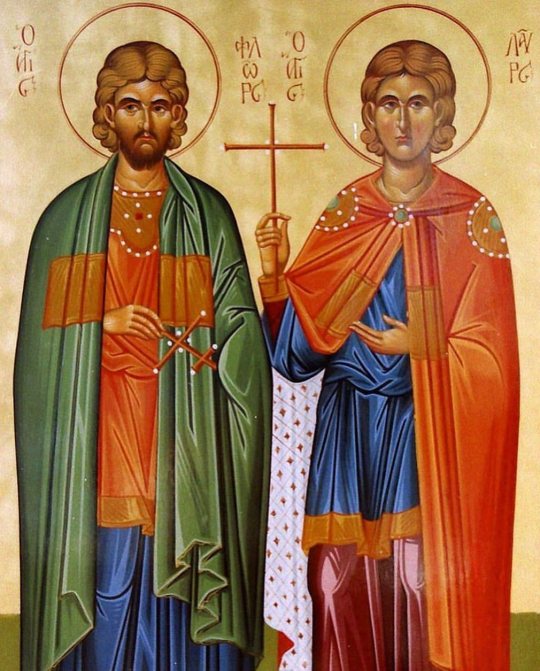
Today we celebrate the Holy Martyrs Florus and Laurus of Illyricum. Saints Florus and Laurus were brothers by birth not only in flesh but in spirit. They lived in the second century at Byzantium, and afterwards they settled in Illyria [now Yugoslavia]. By occupation they were stone-masons (their teachers in this craft were the Christians Proclus and Maximus, from whom also the brothers learned about life pleasing to God). The prefect of Illyria, Likaion, sent the brothers to a nearby district for work on the construction of a pagan temple. The saints toiled at the structure, distributing to the poor the money they earned, while they kept strict fast and prayed without ceasing. Once, the son of the local pagan-priest Mamertin carelessly approached the structure, and a chip of stone hit him in the eye, severely injuring him. Saints Florus and Laurus assured the upset father, that his son would be healed. They brought the youth to consciousness and told him to have faith in Christ. After this, as the youth confessed Jesus Christ as the true God, the brothers prayed for him, and the eye was healed. In view of such a miracle, even the father of the youth believed in Christ. When the construction of the temple was completed, the brothers gathered the Christians together, and going through the temple, they smashed the idols. In the eastern part of the temple they set up the holy Cross. They spent all night in prayer, illumined with heavenly light. Having learned of this, the head of the district condemned to burning the former pagan priest Mamertin and his son and 300 Christians. The martyrs Florus and Laurus, having been sent back to the prefect Likaion, were thrown down an empty well and covered over with earth. After many years, the relics of the holy martyrs were uncovered incorrupt, and transferred to Constantinople. In the year 1200 the Novgorod pilgrim Anthony saw them. Stephen of Novgorod saw the heads of the martyrs in the Pantokrator monastery around the year 1350. May they intercede for us always + Source: https://www.oca.org/saints/lives/2018/08/18/102324-martyrs-florus-and-laurus-of-illyria (at Split, Croatia) https://www.instagram.com/p/ChYBm6GvwUA/?igshid=NGJjMDIxMWI=
4 notes
·
View notes
Text
I think my final weird historical ramble of the day As Brought to You By my research for Lights Out/Old Guard Nicky/Joe fic into the Crusades is how seeing Europeans as like a colonizing force during the Crusades or the Crusades as a “Clash of Civilizations”, East vs. West, Muslims vs. Christians, etc etc, the way many people view it in the US and indeed the way I was initially taught to view that conflict, is wrong because apparently it gives way too much credit for how haphazard, pathetic, and primitive the Europeans actually were.*
I mean, far from being some unstoppable European war machine of CONQUEST and EMPIRE, these hapless European, barely-more-than-barbarian-tribes, forces basically stumbled into establishing a Latin Christian presence in the Levant mostly because of internal political strife on the part of the defending Fatimid Caliphate + the Fatimid’s conflicts with the Seljuk Turks (both Muslims and often conflated by Westerners - basically, the players were Latin Christians and Byzantine Greek Christians, who were often infighting, Seljuk Turkish Muslims and Arabic Fatimid Caliphate Muslims, who were originally fighting but then later once the Europeans arrived were sometimes allied but also each of them respectively were sometimes allied with the Latin Christians once those forces got their feet under them and began to operate as just another political force in the region and ANYWAY THE POINT IS, this whole thing was a MESS and not a clash of two monoliths AT ALL at least not for the first HUNDRED YEARS of the conflict).*
(*according to several lectures I have listened to, please do not consider this comprehensive knowledge, it’s a product of around 100 hours of research, not a PhD)
The thing is, the Europeans didn’t set out to “conquer” the Middle East when they answered Pope Clement II’s call to “liberate” Jerusalem (which was more of a favor that Clement was doing for the Emperor of Constantinople anyway and it backfired for that Emperor in so, so many ways). The Casus Belli really was just to “liberate” the Holy City from the “pagans” (no mentions of Islam as a faith that they were fighting but, interestingly, the Latin Christians, at least the Italians, may not have even really seen Islam as a separate faith as such in fact some may have seen it as a heretical Christian sect which is kind of wild but also, like, a little closer to the reality in that both faiths are Abrahamic as compared to incorrect interpretations that it’s just an entirely “pagan” religion??). So the Christian forces were mustered, it seems for the most part, by Clement inspiring them based on the incredibly devout faith of the Europeans who stepped up for the call, NOT as much by inspiring in them the the hopes of gaining money or territory, except for by a few minor princes who figured out that there was an opportunity to gain territory only AFTER they were there. So, to characterize this conflict as financially motivated on the part of the European Crusaders is to ascribe modern motives to an ancient, truly religiously-motivated conflict.
Now, financially, fortunes WERE made in a very cynical way as a result of this conflict, but it was the CHURCH milking the Crusaders, not the Church expecting to gain any wealth from the Holy Land. They became a de facto bank lending money to Crusaders could buy equipment and horses in exchange for loaning or selling their lands and livestock to the Church (I’m sure Jesus would have LOVED that!) BUT the Crusaders all did so at a HUGE disadvantage because, uh, supply/demand kicked in because there was a TON of land suddenly up for sale and EVERYONE needed a horse (or 3) and weapons and armor and food so you see where this is going the Church made BANK and the Crusaders went BANKRUPT for this cause that they were pretty much doing JUST out of a desire to save their SOULS, NOT out of hope of plunder!
So they eventually get to the Holy Land, probably like 50% of the *knights* who set out to fight there die along the way, let’s not even get INTO the Peasants Crusade or the camp followers/civilians who tagged along. And really, the plan was to kick out the “pagans” from Jerusalem, in theory hand the territory back over to the Byzantine Christians in Constantinople and just... go home. Then a bunch of stuff happened and they stayed.
BUT to go back to my original point, acting like it wasn’t a total haphazard mess that led to the conquest of Jerusalem, let alone holding it, that the Europeans had any idea what they were doing, that they were anything more than just ANOTHER band of smelly barbarians rolling through, setting up some short-lived fortresses and then fucking off again once any kind of serious local resistance gets organized, is to give the Europeans WAY too much credit. They’re not the sophisticated war machines of modern era Imperial Britain or France, these are barely more than Frankish clans and German feudal lords along with a bunch of whackadoodle Christian believers, getting tricked more or less by their religious leaders to go maraud to a random place on the other side of the world, bankrupting and/or killing way more than half of these hapless guys, for reasons that were largely baffling to the more sophisticated governments currently “in power” (for a certain value of “power” given internal divisions in the Fatimid Caliphate).
TL;DR The Europeans were basically a barbarian hoard, who lacked the manpower to do more than cling to the edges of the coast for barely a century before being driven off again. If this was the Romans and the Gauls we’d consider this occupation a footnote, if not for the long-term ramifications that we continue to suffer from this event, but more from the PERCEPTION of this event more than the material reality of it, for the last 1,000 years.
And anyway, as an Ancient Rome/Greece nerd primarily, this has been an interesting thing to learn!
#tog meta#the old guard#kaysanova#tog fic#history#actual historians please be gentle this is as much me trying to put my 101 thoughts in order
70 notes
·
View notes
Text
The 6th house in Astrology
I thought I'd just share this excerpt from "The Plague", which feels like a whole lesson on the 6th house, while also being very relevant in these times of covid-19. It says a lot more than I could ever try to say and explain about the joy of Mars.
"The word 'plague' had just been uttered for the first time. At this stage of the narrative, with Dr. Bernard Rieux standing at his window, the narrator may, perhaps, be allowed to justify the doctor's uncertainty and surprise, since, with very slight differences, his reaction was the same as that of the great majority of our townsfolk. Everybody knows that pestilences have a way of recurring in the world; yet somehow we find it hard to believe in ones that crash down on our heads from a blue sky. There have been as many plagues as wars in history; yet always plagues and wars take people equally by surprise.
In fact, like our fellow citizens, Rieux was caught off his guard, and we should understand his hesitations in the light of this fact; and similarly understand how he was torn between conflicting fears and confidence. When a war breaks out, people say: 'It's too stupid; it can't last long.' But though a war may well be 'too stupid', that doesn't prevent its lasting. Stupidity has a knack of getting its way; as we should see if we were not always so much wrapped up in ourselves.
In this respect our townsfolk were like everybody else, wrapped up in themselves; in other words they were humanists: they disbelieved in pestilences.
A pestilence isn't a thing made to man's measure; therefore we tell ourselves that pestilence is a mere bogy of the mind, a bad dream that will pass away. But it doesn't always pass away and, from one bad dream to another, it is men who pass away, and the humanists first of all, because they haven't taken their precautions.
Our townsfolk were not more to blame than others; they forgot to be modest, that was all, and thought that everything still was possible for them; which presupposed that pestilences were impossible. They went on doing business, arranged for journeys, and formed views. How should they have given a thought to anything like plague, which rules out any future, cancels journeys, silences the exchange of views. They fancied themselves free, and no one will ever be free so long as there are pestilences.
Indeed, even after Dr. Rieux had admitted in his friend's company that a handful of persons, scattered about the town, had without warning died of plague, the danger still remained fantastically unreal. For the simple reason that, when a man is a doctor, he comes to have his own ideas of physical suffering, and to acquire somewhat more imagination than the average. Looking from his window at the town, outwardly quite unchanged, the doctor felt little more than a faint qualm for the future, a vague unease.
He tried to recall what he had read about the disease. Figures floated across his memory, and he recalled that some thirty or so great plagues known to history had accounted for nearly a hundred million deaths. But what are a hundred million deaths? When one has served in a war, one hardly knows what a dead man is, after a while. And since a dead man has no substance unless one has actually seen him dead, a hundred million corpses broadcast through history are no more than a puff of smoke in the imagination. The doctor remembered the plague at Constantinople that, according to Procopius, caused ten thousand deaths in a single day. Ten thousand dead made about five times the audience in a biggish cinema. Yes, that was how it should be done. You should collect the people at the exits of five picture-houses, you should lead them to a city square and make them die in heaps if you wanted to get a clear notion of what it means. Then at least you could add some familiar faces to the anonymous mass. But naturally that was impossible to put into practice; moreover, what man knows ten thousand faces? In any case the figures of those old historians, like Procopius, weren't to be relied on; that was common knowledge. Seventy years ago, at Canton, forty thousand rats died of plague before the disease spread to the inhabitants. But, again, in the Canton epidemic there was no reliable way of counting up the rats. A very rough estimate was all that could be made, with, obviously, a wide margin for error.
'Let's see,' the doctor murmured to himself, "supposing the length of a rat to be ten inches, forty thousand rats placed end to end would make a line of...'
He pulled himself up sharply. He was letting his imagination play pranks, the last thing wanted just now. A few cases, he told himself, don't make an epidemic; they merely call for serious precautions. He must fix his mind, first of all, on the observed facts: stupor and extreme prostration, buboes, intense thirst, delirium, dark blotches on the body, internal dilatation, and, in conclusion... In conclusion, some words came back to the doctor's mind; aptly enough, the concluding sentence of the description of the symptoms given in his medical handbook: 'The pulse becomes fluttering, dicrotic, and intermittent, and death ensues as the result of the slightest movement.' Yes, in conclusion, the patient's life hung on a thread, and three people out of four (he remembered the exact figures) were too impatient not to make the very slight movement that snapped the thread.
The doctor was still looking out of the window. Beyond it lay the tranquil radiance of a cool spring sky; inside the room a word was echoing still, the word 'plague'. A word that conjured up in the doctor's mind not only what science chose to put into it, but a whole series of fantastic possibilities utterly out of keeping with that gray and yellow town under his eyes, from which were rising the sounds of mild activity characteristic of the hour; a drone rather than a bustling, the noises of a happy town, in short, if it's possible to be at once so dull and happy. A tranquillity so casual and thoughtless seemed almost effortlessly to give the lie to those old pictures of the plague: Athens, a charnel-house reeking to heaven and deserted even by the birds; Chinese towns cluttered up with victims silent in their agony; the convicts at Marseille piling rotting corpses into pits; the building of the Great Wall in Provence to fend off the furious plague-wind; the damp, putrefying pallets stuck to the mud floor at the Constantinople lazar-house, where the patients were hauled up from their beds with hooks; the carnival of masked doctors at the Black Death; men and women copulating in the cemeteries of Milan; cartloads of dead bodies rumbling through London's ghoul-haunted darkness, nights and days filled always, everywhere, with the eternal cry of human pain. No, all those horrors were not near enough as yet even to ruffle the equanimity of that spring afternoon. The clang of an unseen streetcar came through the window, briskly refuting cruelty and pain. Only the sea, murmurous behind the dingy checkerboard of houses, told of the unrest, the precariousness, of all things in this world. And, gazing in the direction of the bay, Dr. Rieux called to mind the plague-fires of which Lucretius tells, which the Athenians kindled on the seashore. The dead were brought there after nightfall, but there was not room enough, and the living fought one another with torches for a space where to lay those who had been dear to them; for they had rather engage in bloody conflicts than abandon their dead to the waves. A picture rose before him of the red glow of the pyres mirrored on a wine-dark, slumbrous sea, battling torches whirling sparks across the darkness, and thick, fetid smoke rising toward the watchful sky. Yes, it was not beyond the bounds of possibility....
But these extravagant forebodings dwindled in the light of reason. True, the word 'plague had been uttered; true, at this very moment one or two victims were being seized and laid low by the disease. Still, that could stop, or be stopped. It was only a matter of lucidly recognizing what had to be recognized; of dispelling extraneous shadows and doing what needed to be done. Then the plague would come to an end, because it was unthinkable, or, rather, because one thought of it on misleading lines. If, as was most likely, it died out, all would be well. If not, one would know it anyhow for what it was and what steps should be taken for coping with and finally overcoming it.
The doctor opened the window, and at once the noises of the town grew louder.
The brief, intermittent sibilance of a machine-saw came from a near-by workshop.
Rieux pulled himself together. There lay certitude; there, in the daily round.
All the rest hung on mere threads and trivial contingencies; you couldn't waste your time on it. The thing was to do your job as it should be done."
"The Plague", by Albert Camus.
#the plague#albert camus#hellenistic astrology#astrology#mars#6th house#traditional astrology#covid-19
14 notes
·
View notes